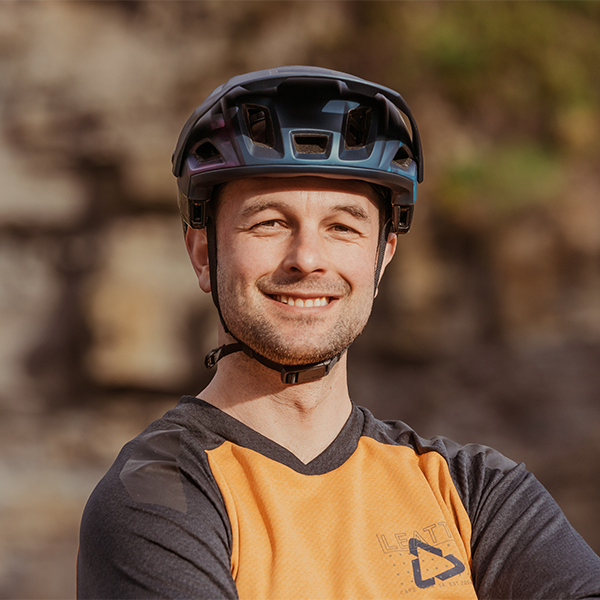Getting the best mountain bike tyres for the type of riding you do and the conditions you typically encounter can be a real headache.
Get it right, however, and tyres – which you'll need to match to your mountain bike wheel sizes – can make a big difference to how your bike behaves. You can spend all you want on the best mountain bike wheels, but they won't fulfil their potential without suitable tyres.
Why is it so tough to find the right tyres? First, there's a lot of assumed knowledge with MTB tyres.
You're expected to know what a mud tyre should look like and where it will perform best. The best winter mountain bike tyres are worth considering if you ride a lot in the wet.
You need to know what type of tread pattern works well on smooth or bumpy terrain, and you need a decent knowledge about carcass thickness and rubber compound.
But, fear not, we've done the leg work for you.
For each tyre, we've added what that model is good at, what it's designed for, whether it's available with different rubber compounds or carcass thicknesses, and which discipline it's most suited to.
You can skip to your preferred discipline using the links below, or head to our buyer's guide for more general advice.
- Best cross-country tyres
- Best downcountry tyres
- Best trail tyres
- Best all-mountain tyres
- Best enduro tyres
- Mountain bike tyres buyer's guide
undefined
Best mountain bike tyres of 2024
Best cross-country tyres of 2024
Cross-country tyres are optimised for tamer trails than their downcountry, trail, all-mountain and enduro counterparts. They are typically lighter weight, given that this is a keen focus for cross-country racing.
Schwalbe Racing Ray Addix Speed
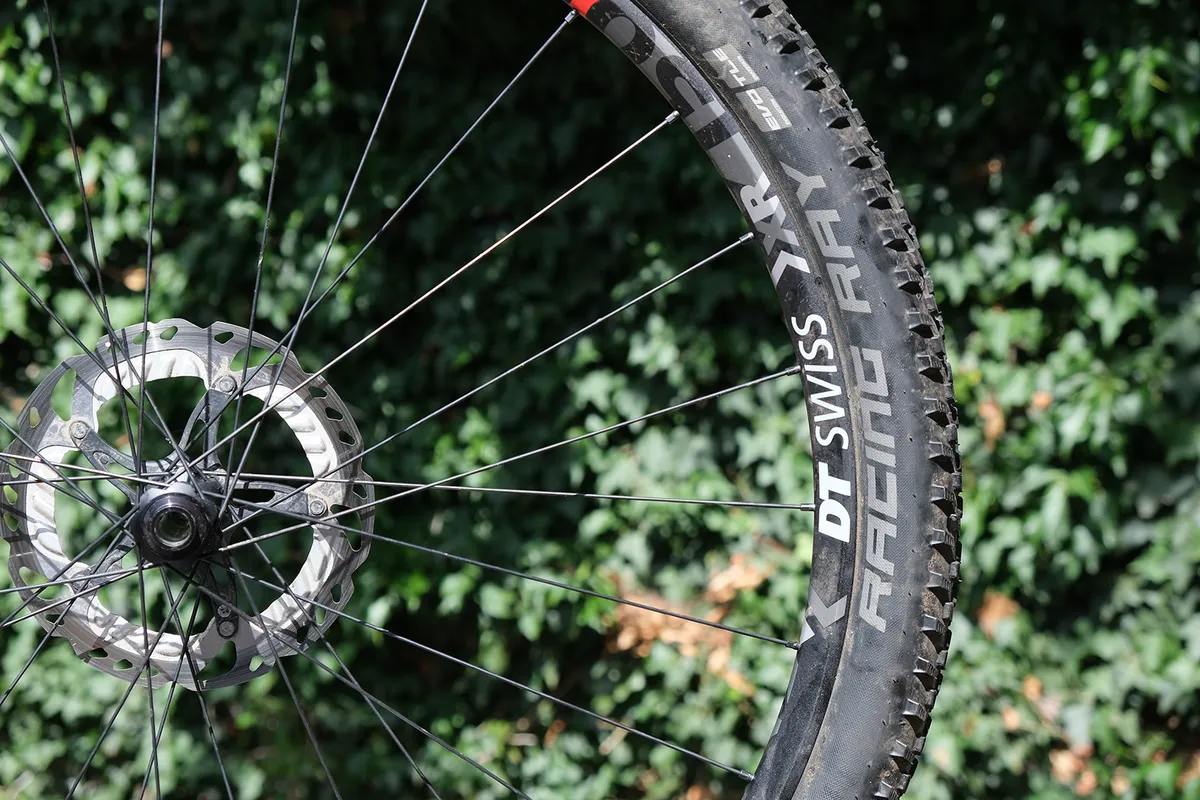
- £51.99 / $65 / €58.99 as tested
- Pros: Fast-rolling tread pattern
- Cons: None
- 692g claimed weight
- 29x2.25in tested
- Best as a front tyre
The Racing Ray is a lightweight, fast-rolling option that corners well. It has a front-specific tread pattern and is designed to be used in tandem with a Racing Ralph rear tyre. The Addix Speed Rubber compound is designed to balance optimum grip, speed and durability. The tyre works very well in most conditions, be it dry or damp. It has great straight-line rolling speed, offers a reassuring feel on corners and is confidence-inspiring when braking.
Schwalbe Racing Ralph Evo TLE
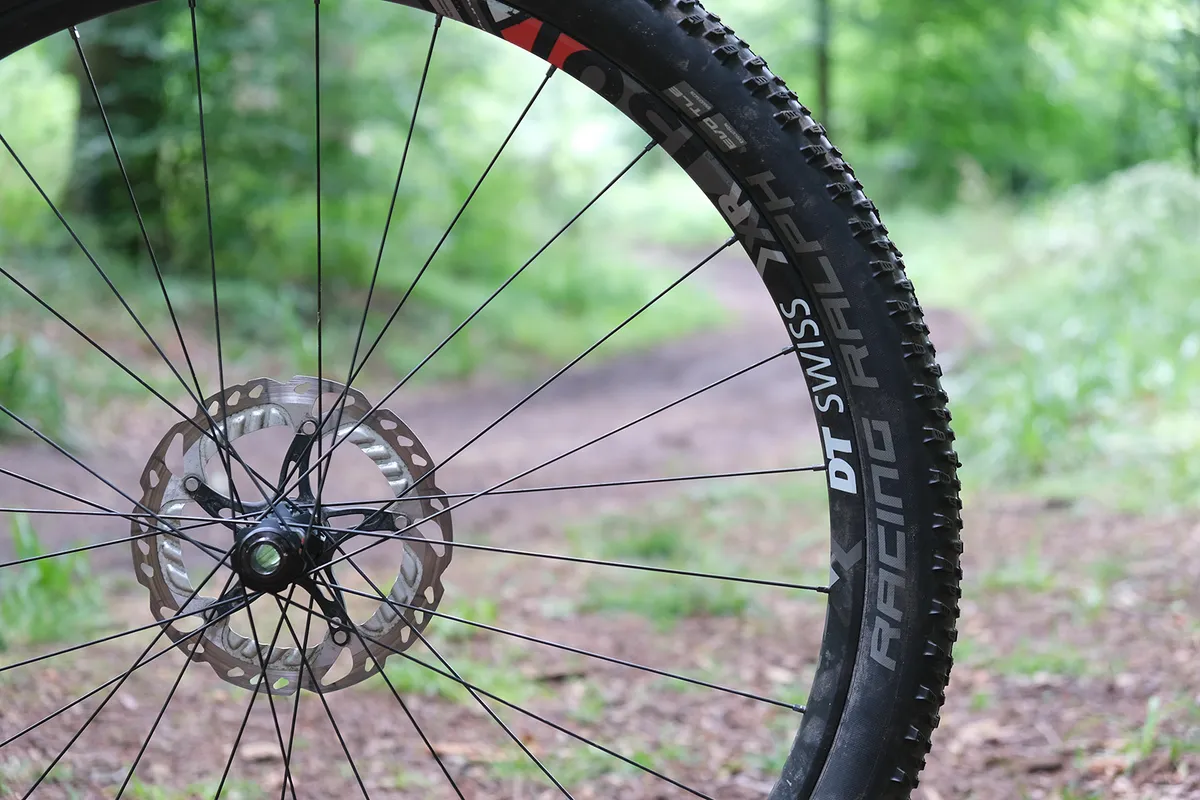
- £51.99 / $65 / €58.99 as tested
- Pros: Exceptional traction and control
- Cons: None
- 697g
- 29x2.25in tested
- Best as a rear tyre
The Racing Ralph excelled with its fast-rolling ride with class-leading traction and control designed for cross-country racing. Although it’s best to use on the rear, you could run the tyre on the front in dry conditions.
The low-profile tread is designed to reduce weight and keep rolling resistance as low as possible. A red stripe around the tyre’s circumference denotes the Addix Speed compound, designed to provide less drag, more grip, durability and damping. The Racing Ralph Evo TLE is a versatile tyre and grips well in all conditions, great for everyday riding and big distance epics.
Continental Race King BlackChili ProTection
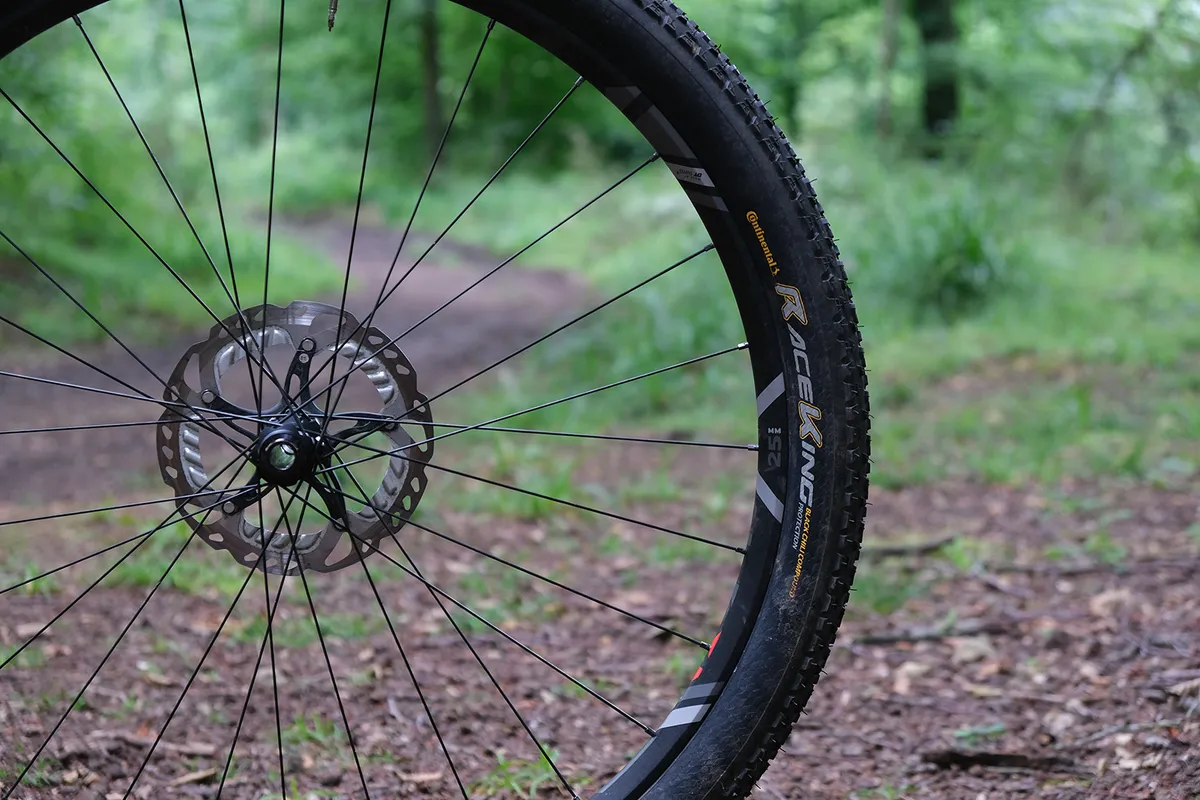
- £60 / $76 / €69.95 as tested
- Pros: Incredibly lightweight; easy installation; good sidewall protection
- Cons: Restricted to dry and hardpack trails
- 626g claimed weight
- 29x2.2in tested
- Use as a front or rear tyre
Continental’s Race King is an extremely lightweight tyre, even with the ProTection sidewall reinforcement. This tyre is best for dry and hardpacked trails and suffers on the worst of mud due to its closely packed tread pattern. It offers a smooth ride over chattery imperfections and encourages tight lean angles.
Schwalbe Rocket Ron Super Ground SpeedGrip
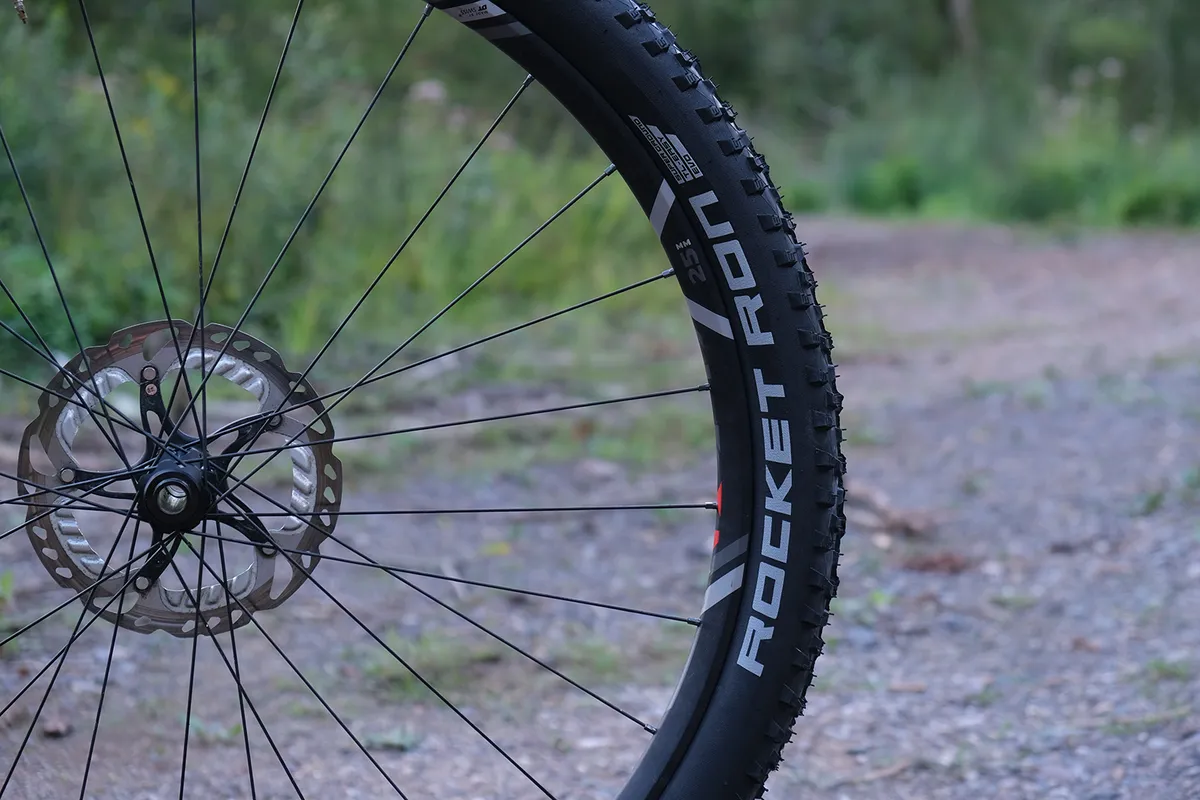
- £67 / $60 / €65 as tested
- Pros: Fast with plenty of grip; versatile tread pattern
- Cons: Speed-focused rather than outright grip
- 687g claimed weight
- 29x2.25in tested
- Use as a front or rear tyre
The Rocket Ron is a fast, grippy tyre that is versatile enough for a range of uses and trail conditions. You could use it for anything from cross-country racing to marathon riding. This particular tyre has Super Ground SpeedGrip casing, signified by the blue stripe on the tyre’s circumference.
This model also foregoes the additional Snakeskin layer – which would denote better sealing, lateral stability and sidewall protection properties – for ultimate weight saving.
Specialized Ground Control
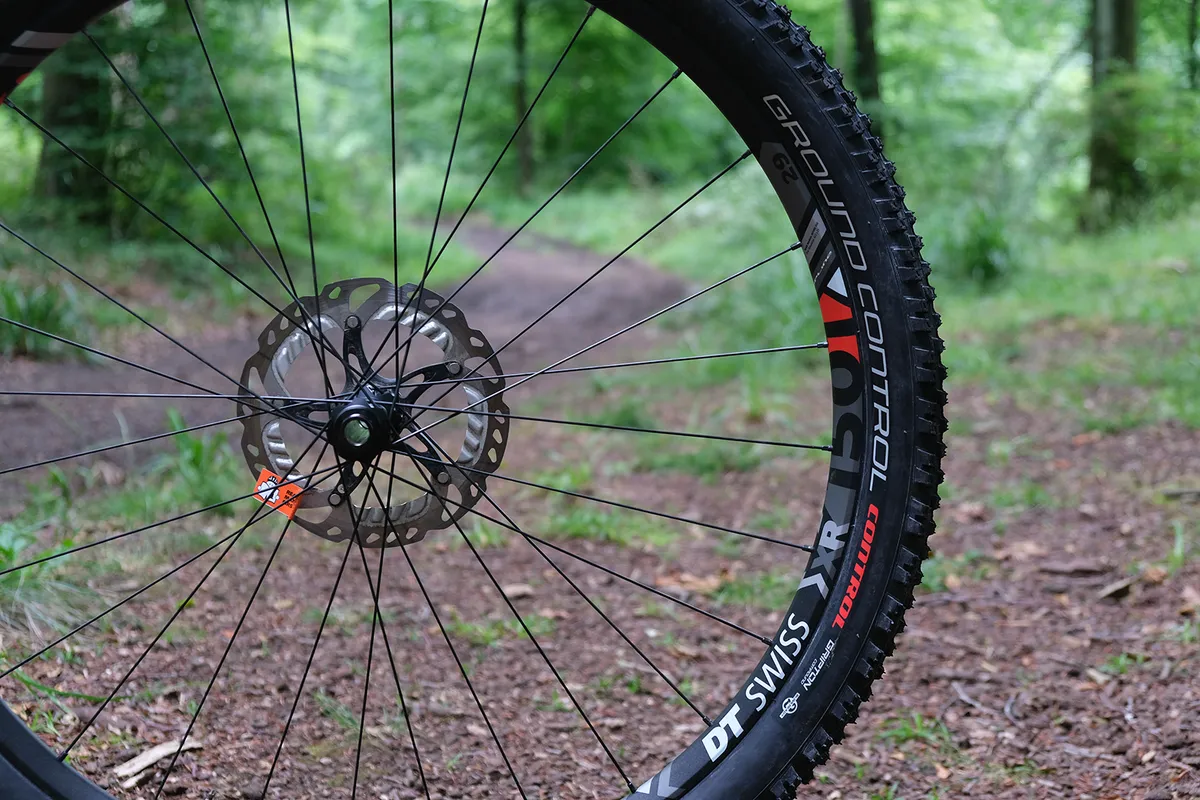
- £49.00 / $60 / €49 / AU$65 as tested
- Pros: Good versatility; provides plenty of grip in a wide array of conditions
- Cons: Not the lightest
- 791g claimed weight
- 29x2.3in tested
- Use as a front or rear tyre
We were impressed with the versatility of the Ground Control due to its tread pattern and Gripton compound, which would also make the tyre a good trail riding option. The Ground Control’s are fast-rolling in the dry and they stick to slippery roots and rocks for longer than most lighter cross-country tyres.
Vittoria Barzo TNT
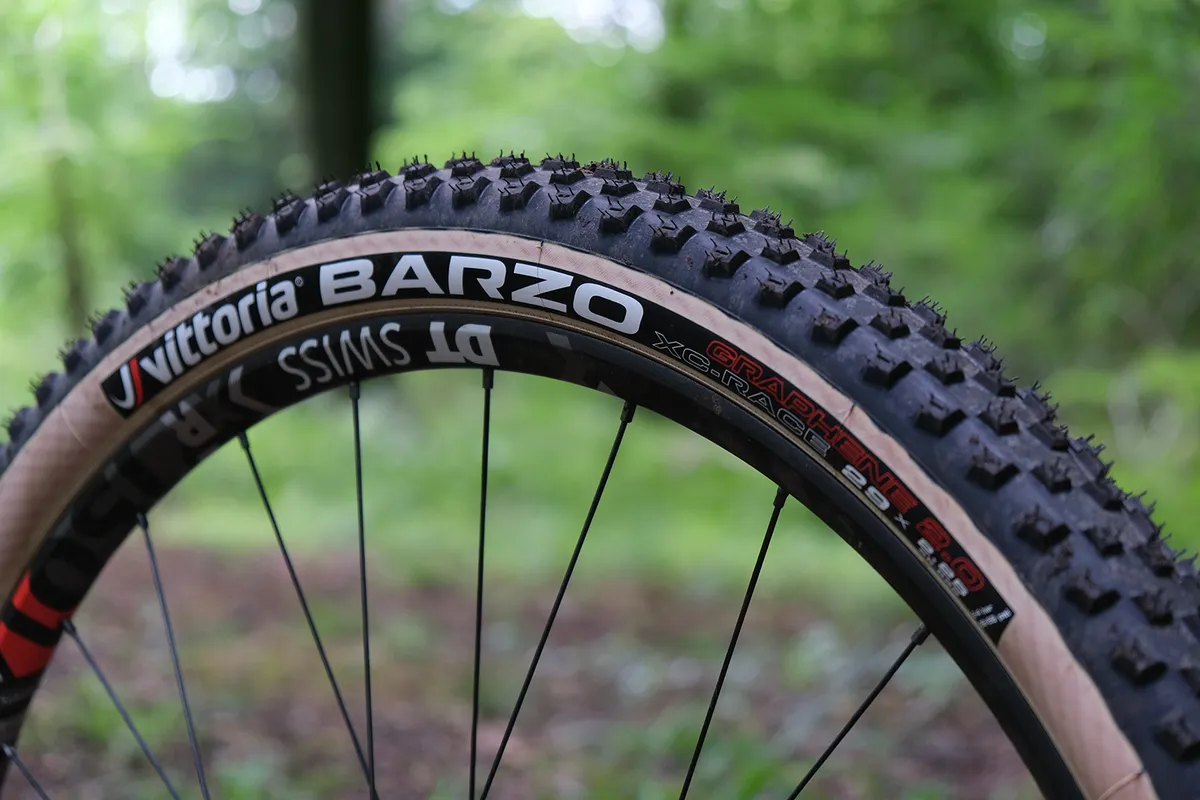
- £55 / $65 / €60 / AU$75 as tested
- Pros: A fast and aggressive tyre for technical courses; provides ample grip on muddy trails
- Cons: Overkill on super-dry trails
- 676g claimed weight
- 29x2.25in tested
- Use as a front or rear tyre
The Vittoria Barzo makes for a strong choice on technical courses with its carefully aligned centre blocks, particularly on intermediate to muddy terrain. The open design of the tread pattern helps shed mud quickly and you could use them for trail riding too. The trade-off is that the Barzo suffers on drier terrain.
Best downcountry tyres of 2024
Downcountry tyres are a little heavier than cross-country tyres, since weight is not the main focus. They are optimised for slightly burlier terrain and would also be a good choice to fit on a cross-country bike if you want to take it on more technical terrain.
Maxxis Rekon 3C Maxx Terra EXO+
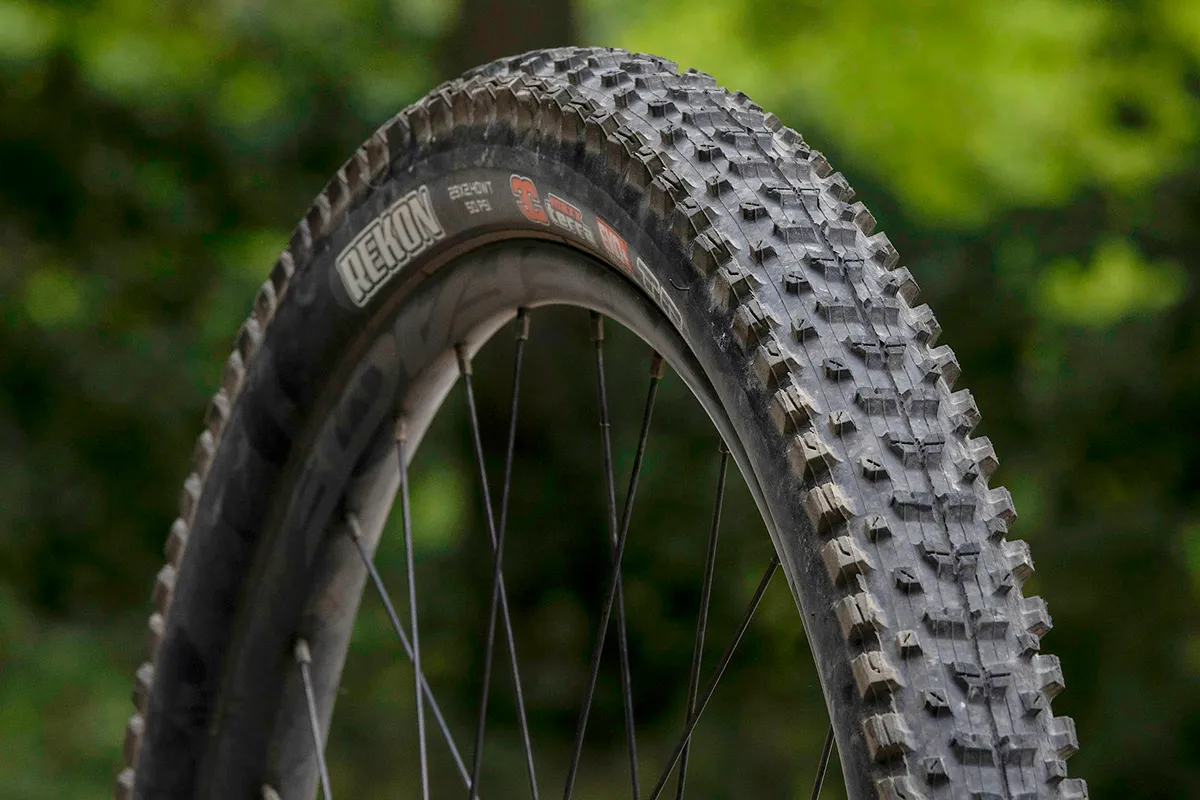
- £70 / $95.49 / €87.49 as tested
- Pros: Fast-rolling and predictable on greasy or wet surfaces; comfortable; fast-rolling
- Con: Side lugs could be more aggressive; can clog quickly on clay trails
- 890g claimed weight
- 29x2.4in tested
- Can be used on the front or rear for most of the year
This Rekon uses Maxxis’ improved EXO+ casing. It's a fast-rolling XC-treaded tyre that’s up to handling roots and pointier rocks.
The tyre gives a well-cushioned ride and has great durability. The Maxx Terra compound makes it predictable and sure-footed on greasy and wet terrain.
The 2.6in width doesn’t feel too floaty or vague, but its small knobs struggle to penetrate dust and slop, and can clog in clay. The side tread isn’t as aggressive as some.
Schwalbe Wicked Will Super Race
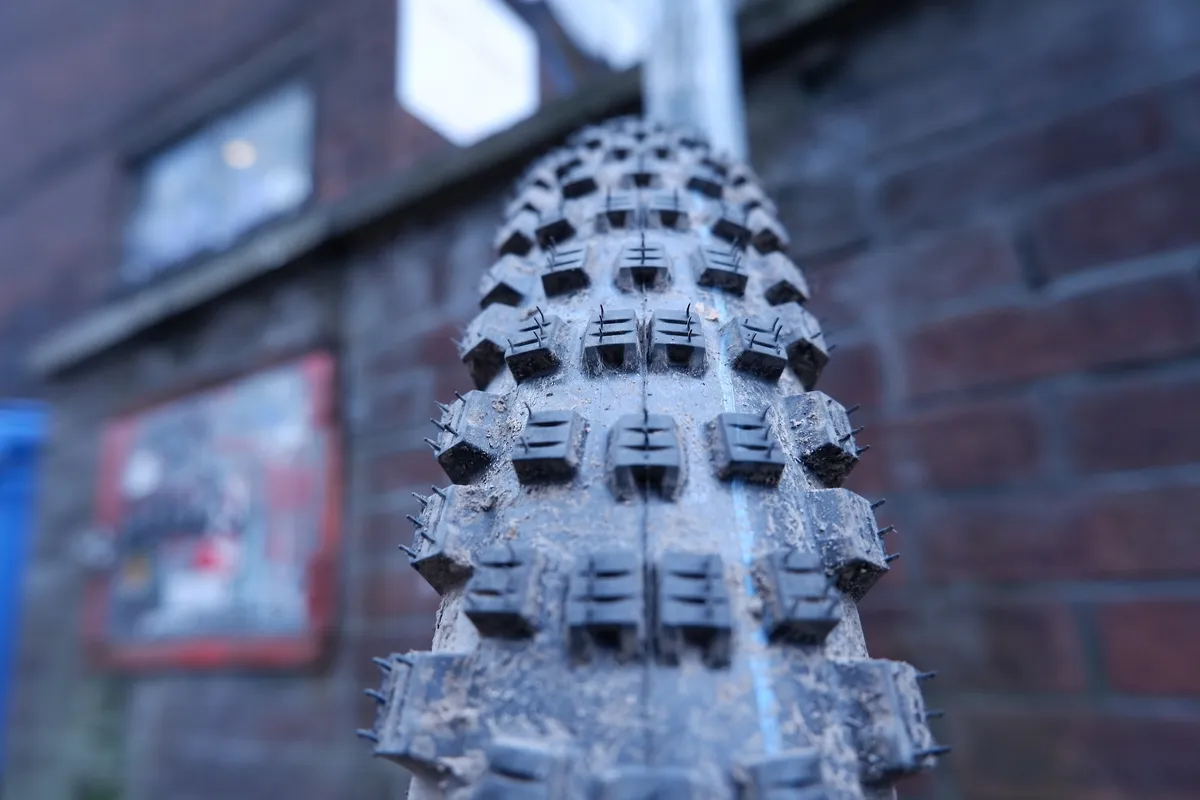
- £62.99 / $71.49 / €82.41 as tested
- Pros: Lightweight and versatile; rolls fast with good grip in most conditions
- Cons: Rounded shape doesn't provide the most confidence on wet trails
- 816g actual weight
- 29x2.4in tested
- Can be used as a winter-ready XC tyre, as a Summer front tyre or as a rear all-year round
Schwalbe’s Wicked Will Super Race tyre rolls fast and grips well, and proved easy to install on a range of rims. Acceleration and braking are excellent. Its tread consists of a series of square blocks that are relatively closely packed and not too deep in construction.
The Speed Grip rubber isn’t the stickiest, although its only slimy rocks and roots that will cause it to slip up, and it’s not the most confident tyre on corners.
Hutchinson Wyrm Racing Lab
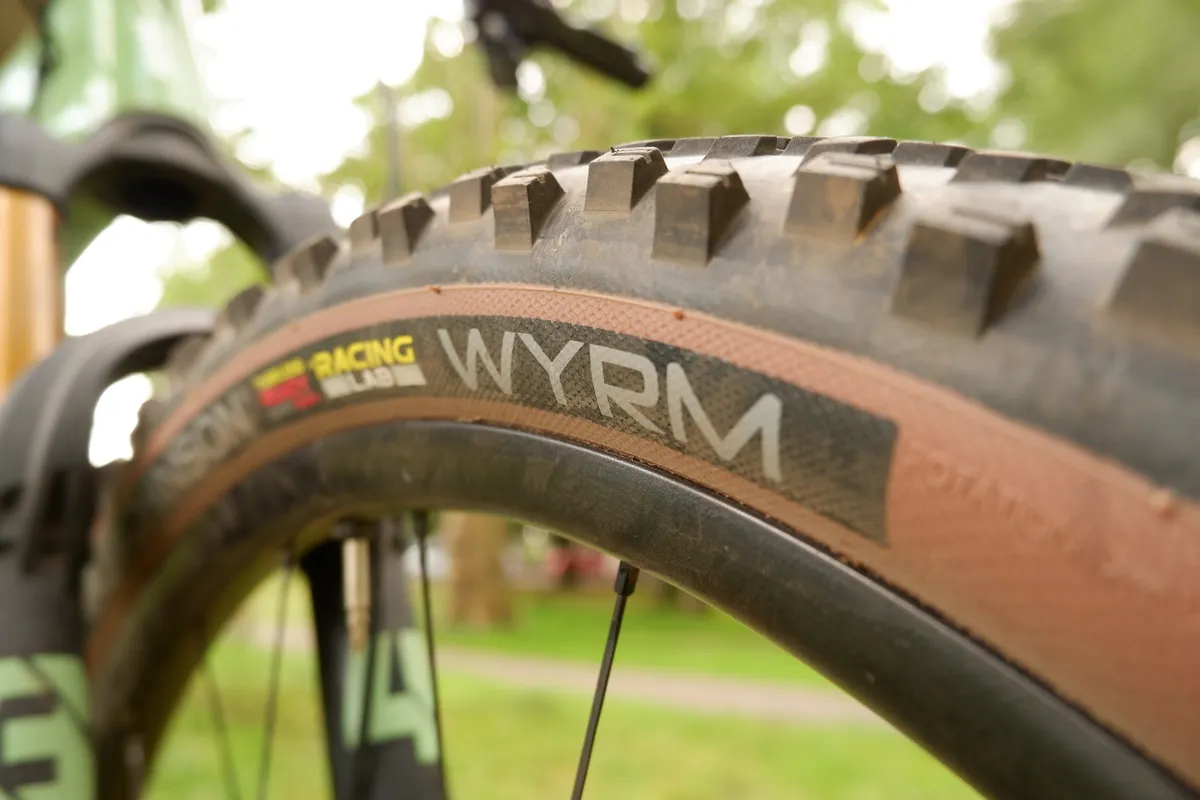
- £69.95 / €75.99 as tested
- Pros: Fast-rolling on smooth terrain; good braking performance
- Cons: Shoulder lugs could be more aggressive; not the most supple tyre
- 899g
- 29x2.4in tested
- Can be used on the front and rear
The Wyrm is a focused downcountry tyre spanning the gap between XC and trail, proving versatile for high-rolling performance and grip. It could also be considered as a winter tyre on the front of your cross-country bike.
The tyre rolls easily on smooth surfaces, and while not the fastest, there is very little drag, resulting in minimal buzz when riding on-road.
The strong sidewalls feel secure when loaded up in corners and we found the tyre to be well damped over rocks, staying accurate without pinging around like some tyres.
While the shoulder blocks dig into the terrain well, we found their small profile meant we needed to really lean the bike over to find all the grip on offer.
Maxxis Ardent EXO TR
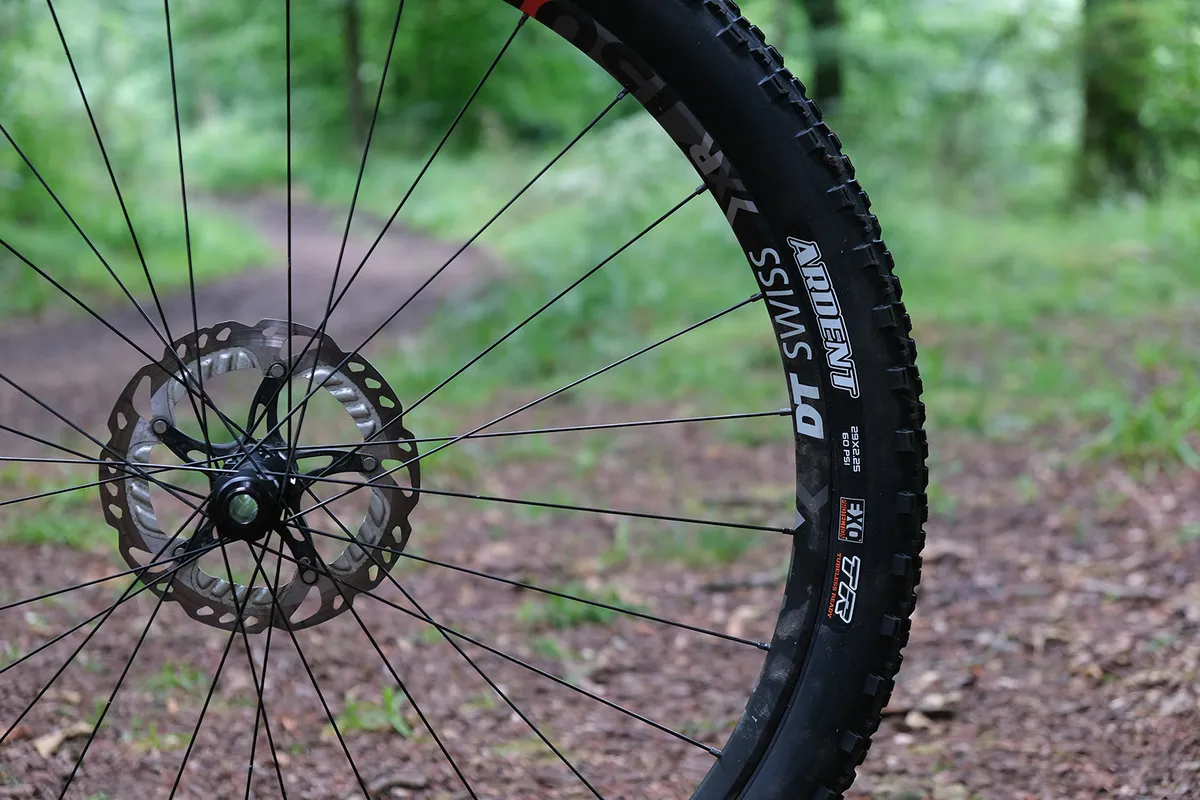
- £50 / €54 / $61 as tested
- Pros: Easy installation; tough and reliable; good cornering bite
- Cons: Not the lightest for racing
- 839g claimed weight
- 29x2.25in tested
- Best as a front tyre
Although we’ve classed the Maxxis Ardent EXO TR as a downcountry tyre, it could also serve as a lightweight trail option too. It’d be on the heavy side if you were to use it for cross-country racing.
The Ardents impressed us with its assured cornering and fast-rolling ride. The sidewalls are beefed up for puncture protection.
Their stability is noticeable when sprinting out of corners and building up speed over crests and climbs.
They maintain their momentum well once up to speed. The shoulder blocks are massive compared with cross-country tyres, allowing you to take more chances in corners.
Vittoria Syerra 4C
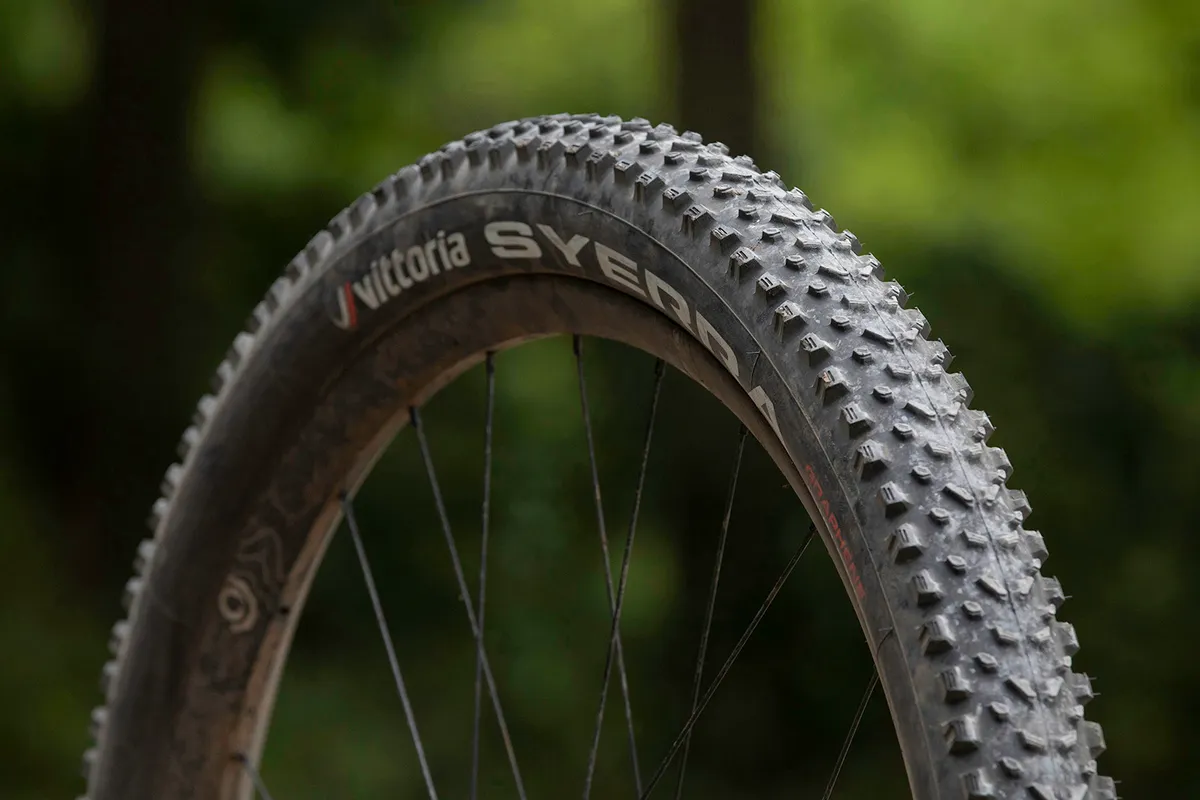
- £55 / $80.99 / €63.95 as tested
- Pros: Brilliant in the dry with a good wear life; confident and planted ride; plenty of grip
- Cons: Not the most confident on greasy trails
- 855g claimed weight
- 29x2.4in tested
- Can be used as a front tyre in dry conditions, but favoured on the rear
The Syerra's tread pattern is spikier than most XC-derived designs and rips into dry earth, delivering tons of traction while still providing high rolling speeds.
It gives a confident, planted ride with decent isolation from the ground for comfort. The tough casing and sidewalls make it pretty robust, although Vittoria’s quad-compound has a slightly buzzy, bouncy feel.
Wear life is excellent and mechanical grip very high. This is a fast-accelerating, versatile tyre.
Teravail Ehline Light & Supple
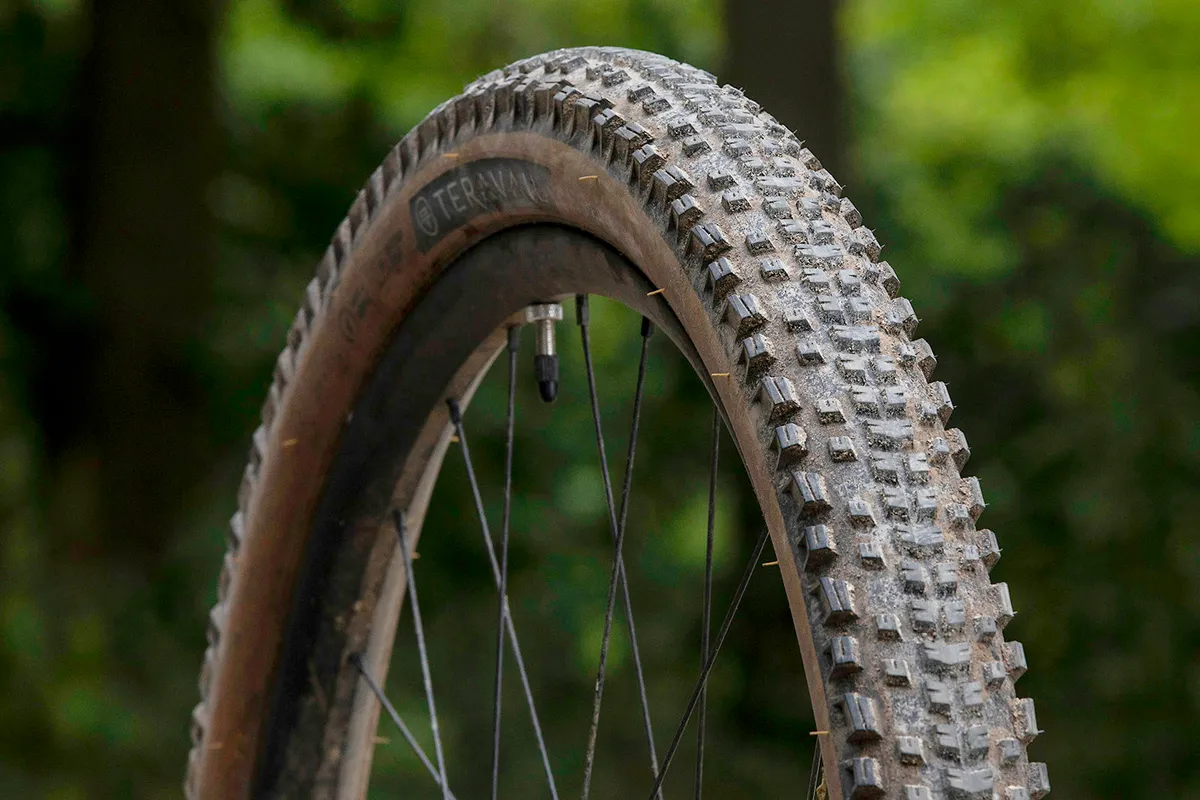
- £65 / $70 / €74.99 as tested
- Pros: Extremely supple; fast-rolling on smooth trails
- Cons: Casing damages easily; not the grippiest on slimey trails; expensive
- 730g claimed weight
- 29x2.3in as tested
- Front and rear capable
The Ehline is very light and has supple sidewalls that conform over small bumps. It's super-fast rolling and extremely comfy.
The tread pattern and single-compound rubber combine to deliver good mechanical grip and cornering hold, while the shoulder blocks do a better job of clearing mud than most.
The almost smooth and steeply ramped central band makes acceleration snappy. The ‘Light & Supple’ sidewalls are prone to rock damage, so the ‘Durable’ casing is advised for rockier trails. It can lose traction up steep pitches, especially on wet grass or dirt.
Specialized Purgatory GRID 2Bliss T7
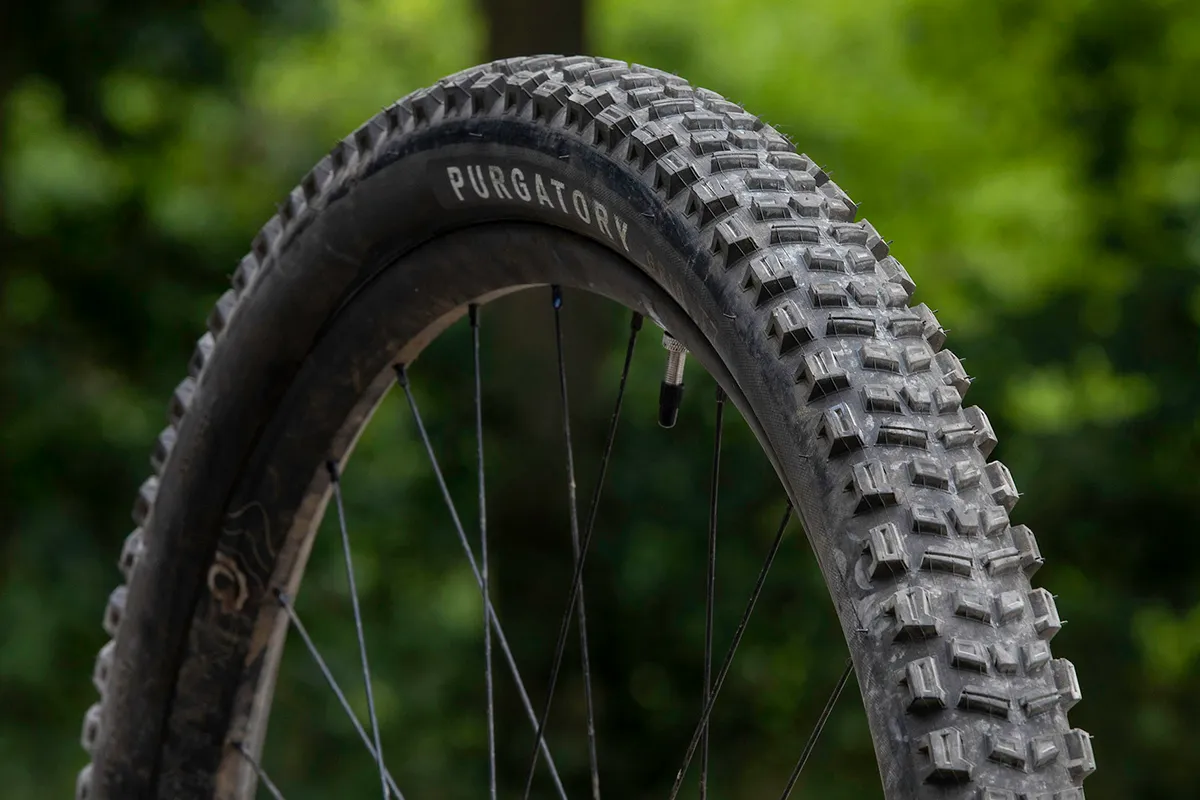
- £37.50 / $65 / €45 as tested
- Pros: Well-priced; high levels of grip in a variety of conditions; good brake bite
- Cons: Not the fastest-rolling tyre; can twist in high-load corners
- 835g claimed weight
- 29x2.3in as tested
- Front or rear
Specialized's Purgatory offers great braking traction for faster, more aggressive riders. Chunky shoulder lugs offer stable reinforcement through corners, making the bike feel truly planted.
The squared-off shape steers true and isolates trail chatter effectively.
On hardpack, it doesn’t have the sidewall support to back up its cornering grip at lower pressures, however.
Best trail tyres of 2024
Trail tyres are heavier than cross-country and downcountry tyres and are designed for improved grip and control on more technical terrain. There are a range of trail tyres for different purposes and conditions.
Schwalbe Magic Mary Super Trail Addix Soft TL Easy
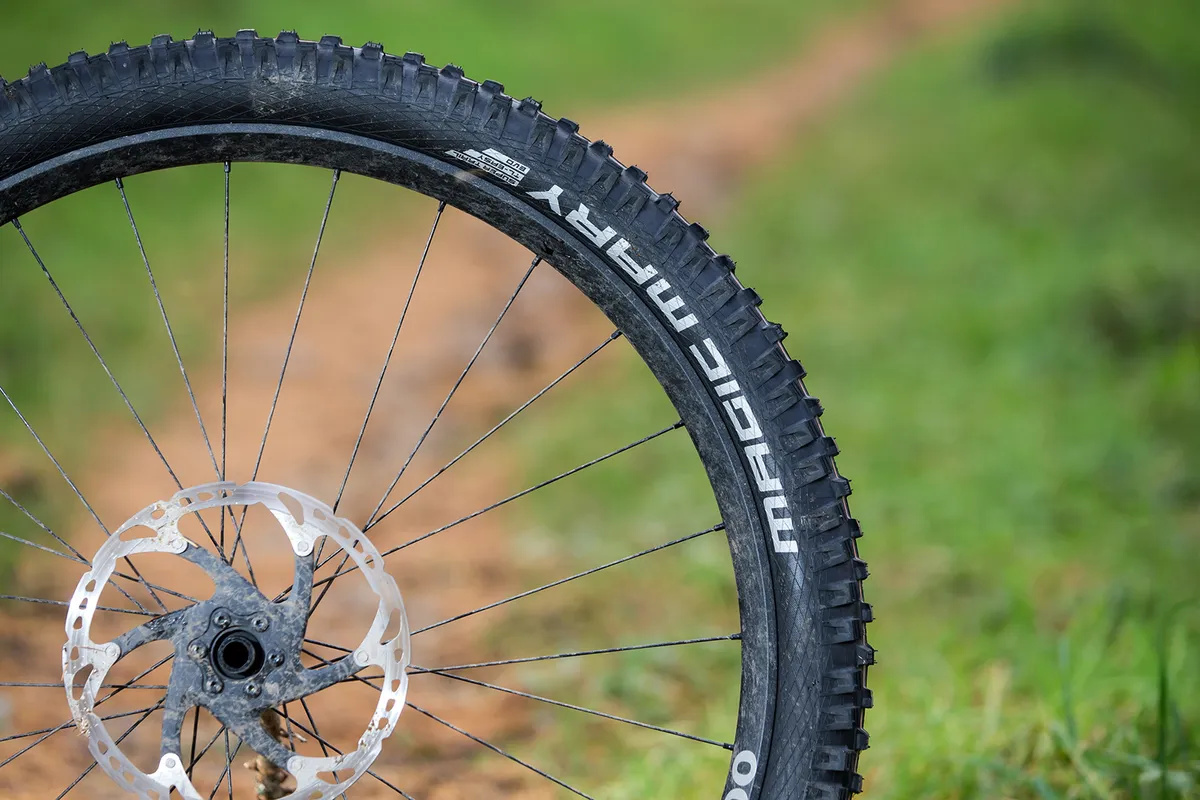
- £62 / $75.99 / €80.99 as tested
- Pros: Incredibly predictable in the corners; surprisingly low rolling resistance; well-damped carcass
- Cons: None
- 1,244g claimed weight
- 29x2.4in tested
- Best as a front tyre
This iteration of the Magic Mary seriously impressed with their best in-class cornering, surprisingly low rolling resistance and well-damped carcass.
They feature strong shoulder knobs for cornering and grip to all terrain types, from mud to hardpack. The sticky compound glues to hardpack terrain whereas larger knobs dug into softer ground. They were easy to set up and a true fit-and-forget option. We can’t fault them.
We’ve also tested the Schwalbe Magic Mary SuperTrail Addix UltraSoft EVO which scored 4.5 stars. We found these tyres also offered amazing grip but at the expense of rolling speed and durability.
Schwalbe Nobby Nic Evo ST Addix Soft
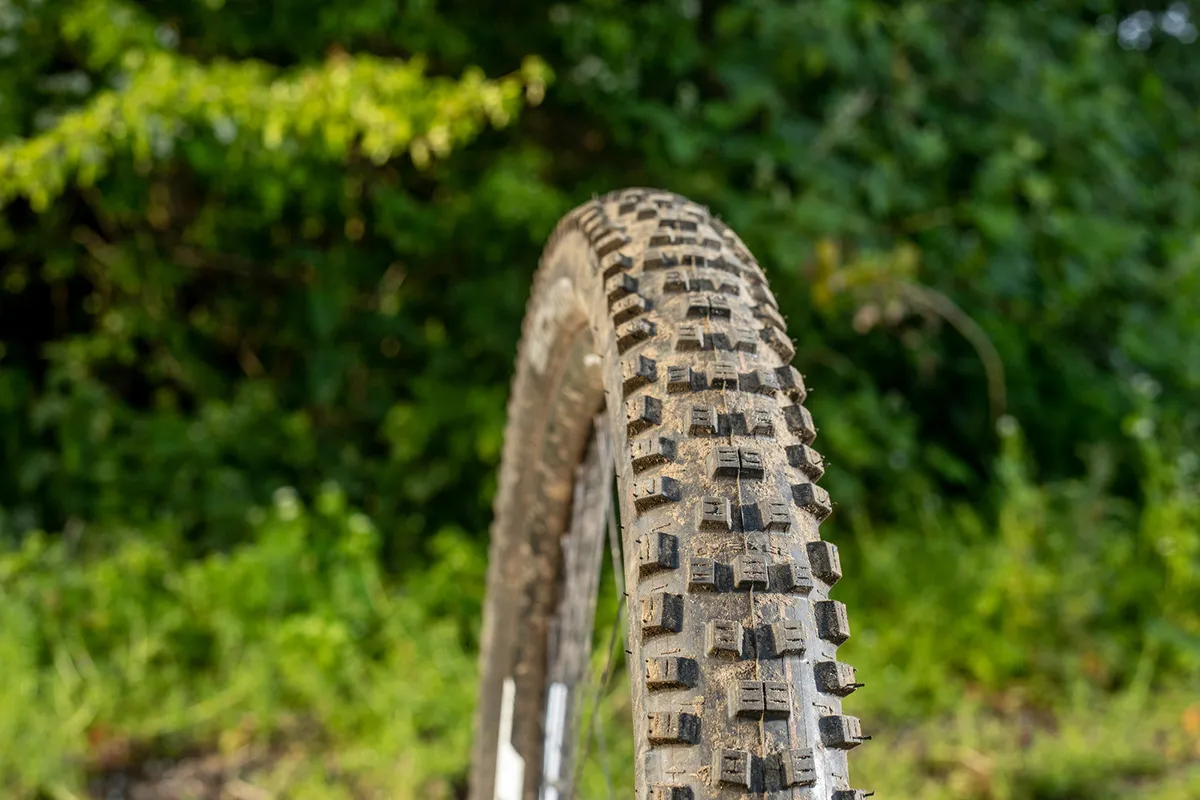
- £65 / $69.99 / €69.90 as tested
- Pros: Very fast-rolling with high-levels of grip; springy feeling; carries speed well
- Cons: Not the best on hard lean angles; rounded shape feels less planted at high speeds
- 960g claimed weight
- 29x2.35in as tested
- Best suited to the rear wheel
The Nobby Nic is an all-rounder capable on steeper enduro trails. The Super Trail casing incorporates SnakeSkin puncture protection, Apex reinforcement, and a bumper around the bead and lower sidewall to resist bottom-out damage.
It has a springy feel that helps maintain speed, and finds traction on all surfaces. Its rounded shape makes it less planted on the crown at higher speeds but provides continuous steady grip.
The side lugs are a bit wide and flat to really claw in if you lean over hard.
Tioga Edge-22
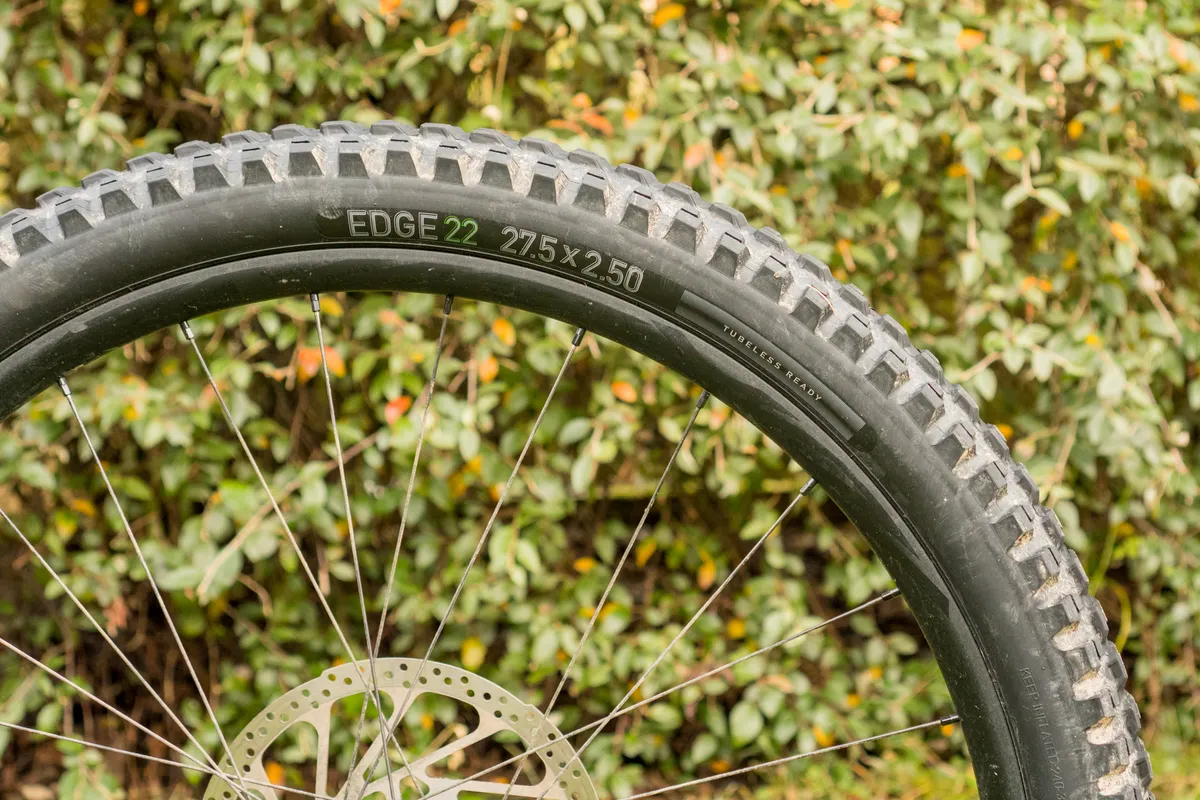
- £64.99 / $65 / €77.95 as tested
- Pros: Predictable in a variety of conditions; impressive cornering grip; lightweight
- Cons: Limited compound and casing options
- 905g claimed weight
- 27.5x2.5in tested
- Best as a front tyre
Another tyre with excellent cornering predictability, the Tioga Edge-22 is lightweight and easy to control. Its blocks closely resemble a Maxxis Minion DHF front tyre, with a large central channel.
We’d like to see more casing and compound options to suit a greater variety of trail conditions.
Read our full Tioga Edge-22 tyre review
Maxxis Shorty 3C Max Terra EXO
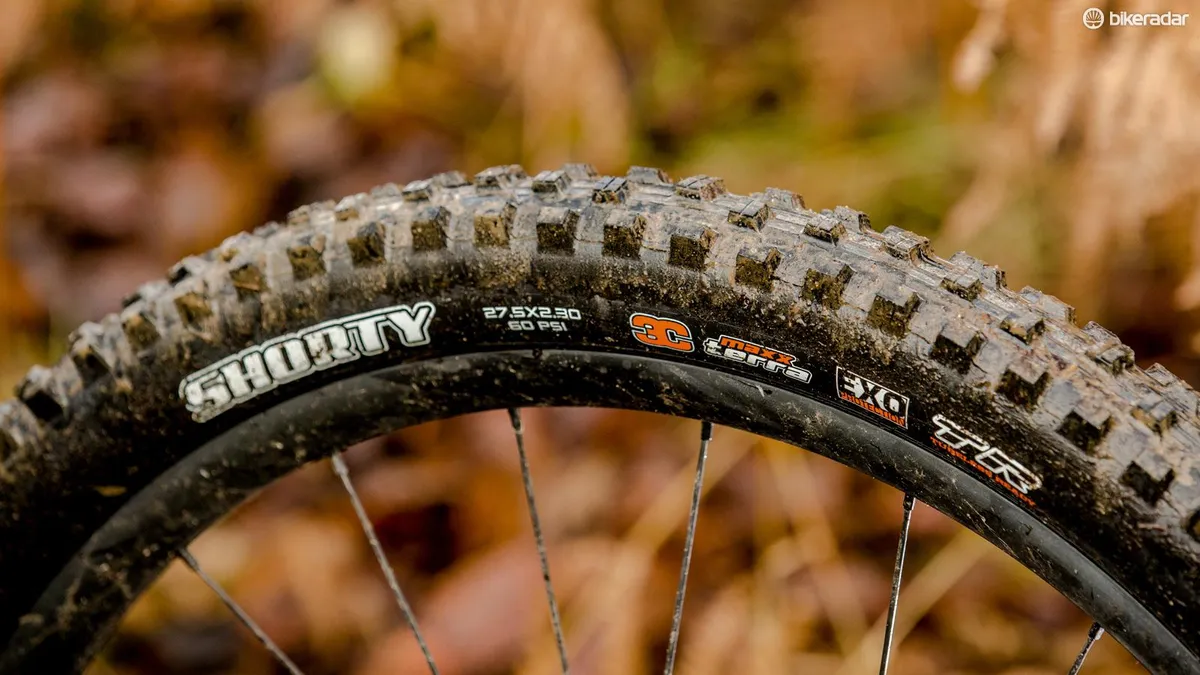
- £60 / $75 / €69.99 as tested
- Pros: Great mud-clearing ability; plenty of grip in soft conditions; remains sprightly on hardpack trails
- Cons: Compound doesn't stick to trails like other compounds in the range
- 1,028g claimed weight
- 29x2.5in tested
- Best as a front tyre
The Maxxis Shorty 3C Max Terra EXO is a mud-specific tyre that offers exceptional levels of grip thanks to its tall, aggressive blocks that bite through soft ground.
Despite its large blocky tread, the Shorty still grips fairly well once it dries out. We've seen downhill and enduro racers use the Shorty in completely dry conditions with deep dust.
WTB Verdict TCS Light High Grip + Slash guard
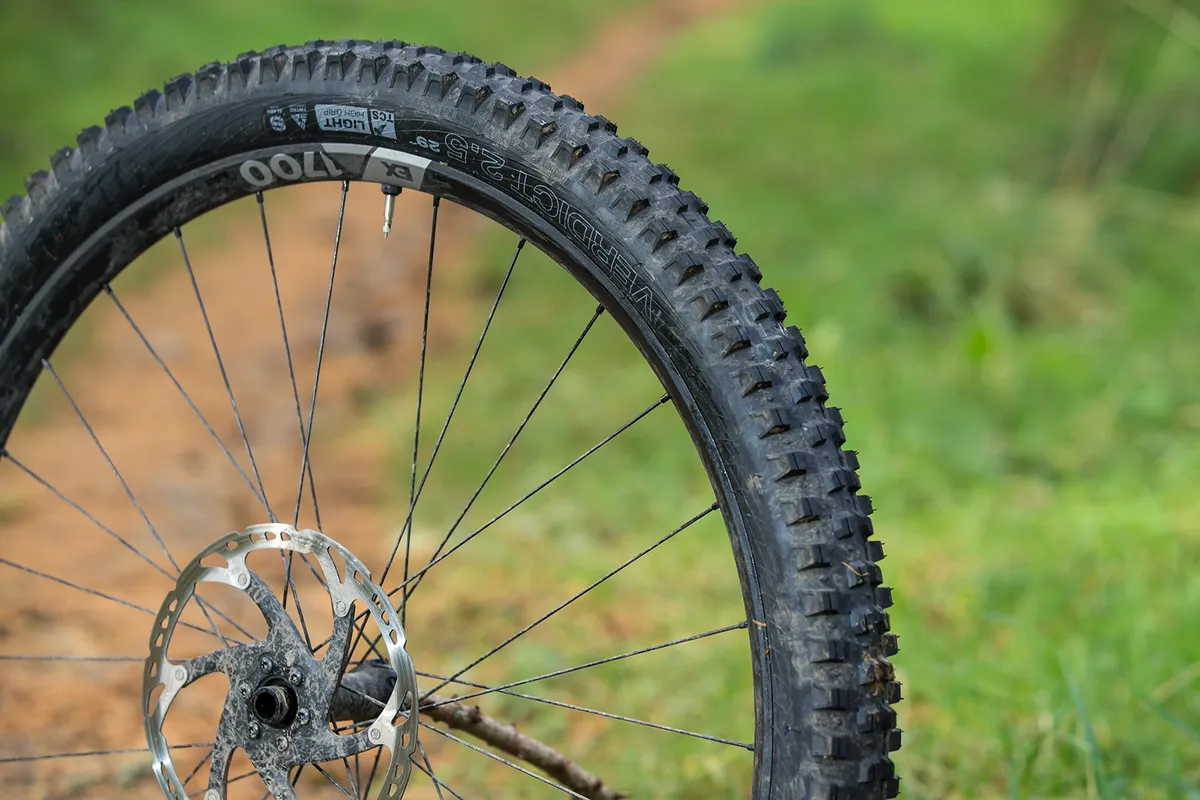
- £50 / $71 / €74.99 as tested
- Pros: Impressive grip; plenty of carcass support; good braking traction
- Cons: Not the best on hardpack terrain
- 1,139g claimed weight
- 29x2.5in tested
- Best as a front tyre
Built for the muddiest, softest conditions, the WTB Verdict has chunky and widely-spaced knobs. The impressively soft compound stuck to rocks and roots predictably, regardless of speed. Braking traction was great and the light casing was well-damped. It took several attempts to seat the bead correctly on our test tyre though.
Best all-mountain tyres of 2024
All-mountain bridges the gap between trail and enduro. The tyres here are adept in technical terrain but will also be a solid choice for all-day pedalling.
Maxxis Minion DHF EXO+ TR 3C MaxxTerra
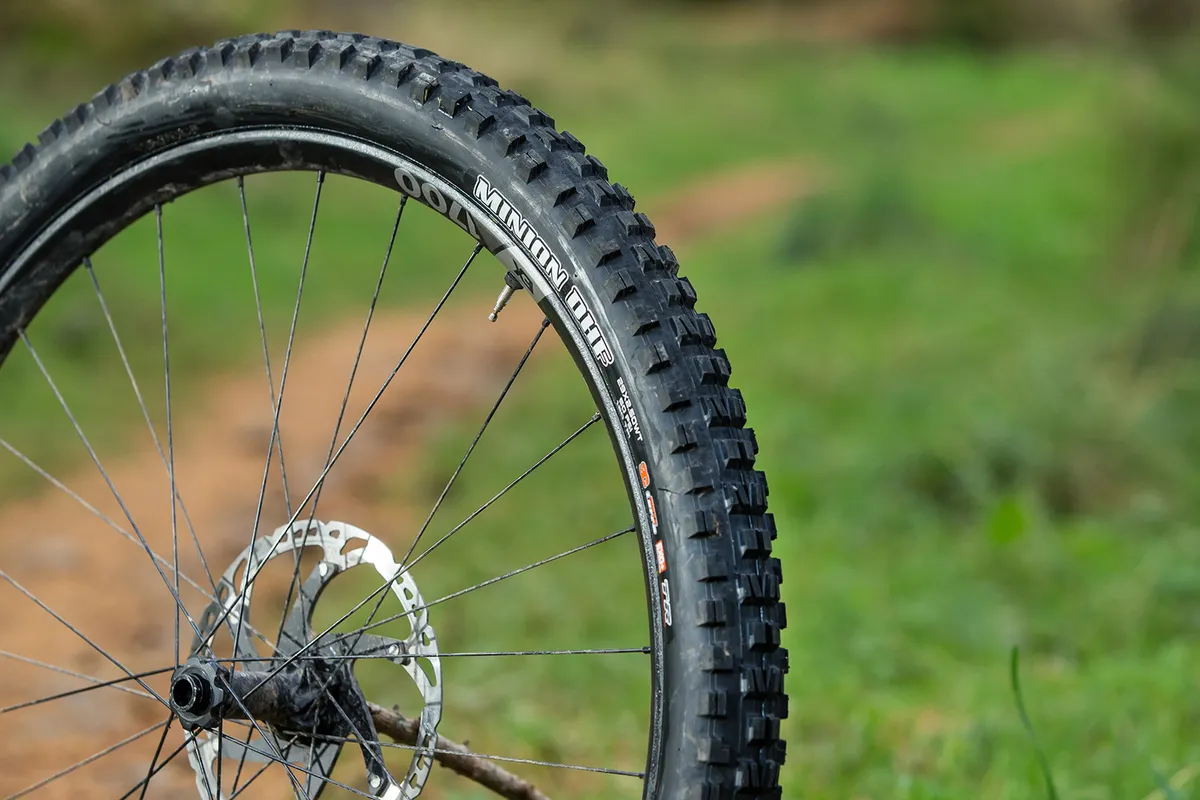
- £75 / $79 / €93.49 as tested
- Pros: Easy installation; excellent cornering traction; great grip on hardpack terrain
- Cons: Braking traction not amazing; MaxxTerra compound not the best suited to wet conditions
- 1,239g claimed weight
- 29x2.5in tested
- Best as a front tyre
The Minion DHF has been long been a versatile stalwart of the Maxxis range and its latest edition continues that trend. The tread pattern is designed for cornering prowess and rolling speed. The side knobs angle slightly outwards, increasing cornering capabilities and predictability.
We found the Minion DHF to have excellent grip, particularly on hardpack. That said, the MaxxTerra compound suffers in wet conditions and it’s not the best tyre for braking traction. The Minion DHF in this variant is ideal as a dry-weather, speed-focused tyre.
Best enduro tyres of 2024
Enduro tyres are designed for more gravity-focused riding and they need to instil confidence and control on rough, technical downhill descents. They also need to pedal well uphill, but there is less of a focus on this aspect compared with trail and all-mountain riding.
Maxxis Minion DHF Wide Trail 3C TR EXO
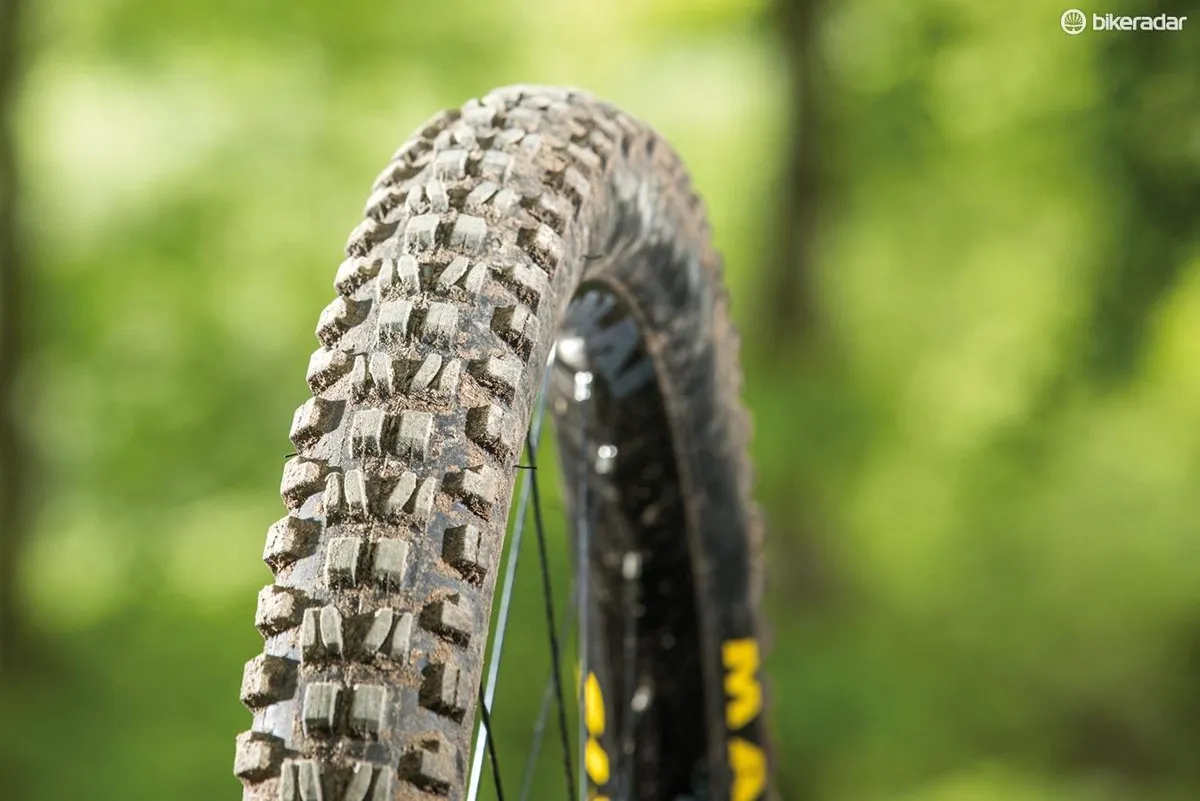
- £64.99 / $84.99 / €87.49 as tested
- Pros: Excellent grip in all conditions; well-damped; easy installation; reasonable rolling speed
- Cons: Pricey
- 980g claimed weight
- 29x2.5in tested
- Best as a front tyre
Arguably the benchmark of performance for the best mountain bike tyres, the Maxxis Minion DHF Wide Trail 3C TR EXO is a favourite with gravity-fed DH and enduro riders and all-day trailblazers alike.
Its time-proven tread pattern offers predictable grip on a wide range of trail surfaces and the large centre blocks mean it rolls well to boot. The Minion DHF's lack of grip in properly sloppy and boggy conditions is its only pitfall.
We tested the triple-compound 3C version of the DHF, which offers the ultimate mix of grip, damping and suppleness, but there's also the cheaper, dual-compound DC version, while the DD is reinforced for flat-out downhill riding.
Maxxis Minion DHR II 3C MaxxGrip DD
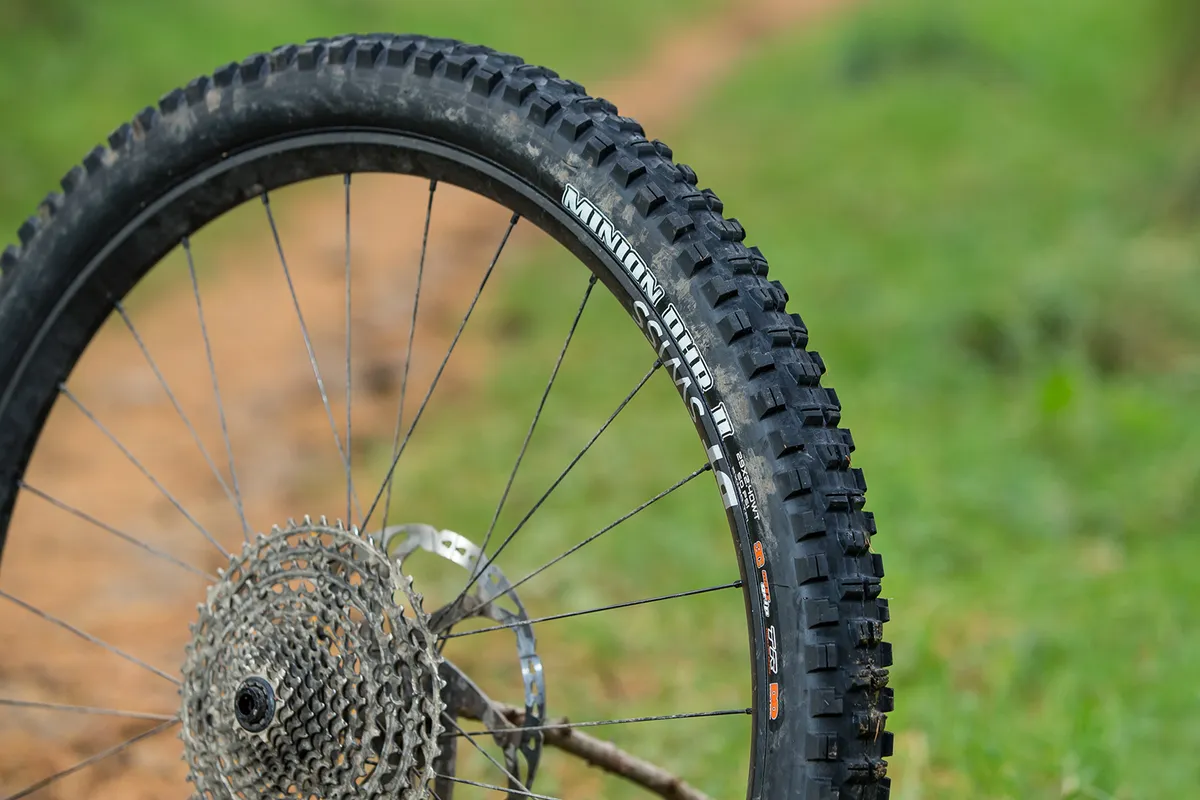
- £69.99 /$95.49 / €87.49 as tested
- Pros: Great carcass support with damped feel; predicatible grip with high lean angles; good braking bite
- Cons: Mud shedding could be better
- 1,239g claimed weight
- 29x2.4in tested
- Best as a rear tyre, but could be used on the front if you’re riding trails that are very steep with lots of braking
The Maxxis Minion DHR II impressed with its ride feel and high grip in almost all conditions. It has an assured feel under braking and easily attainable lean angles. This is largely due to the fact that the DHR II’s side knobs are shared with the Minion DHF.
In Double Down casing, which is what we have here, they will handle a serious amount of abuse. The one thing to be aware of is that the tyre clogs in thick mud.
Michelin Wild Enduro Front Gum-X and Magi-X
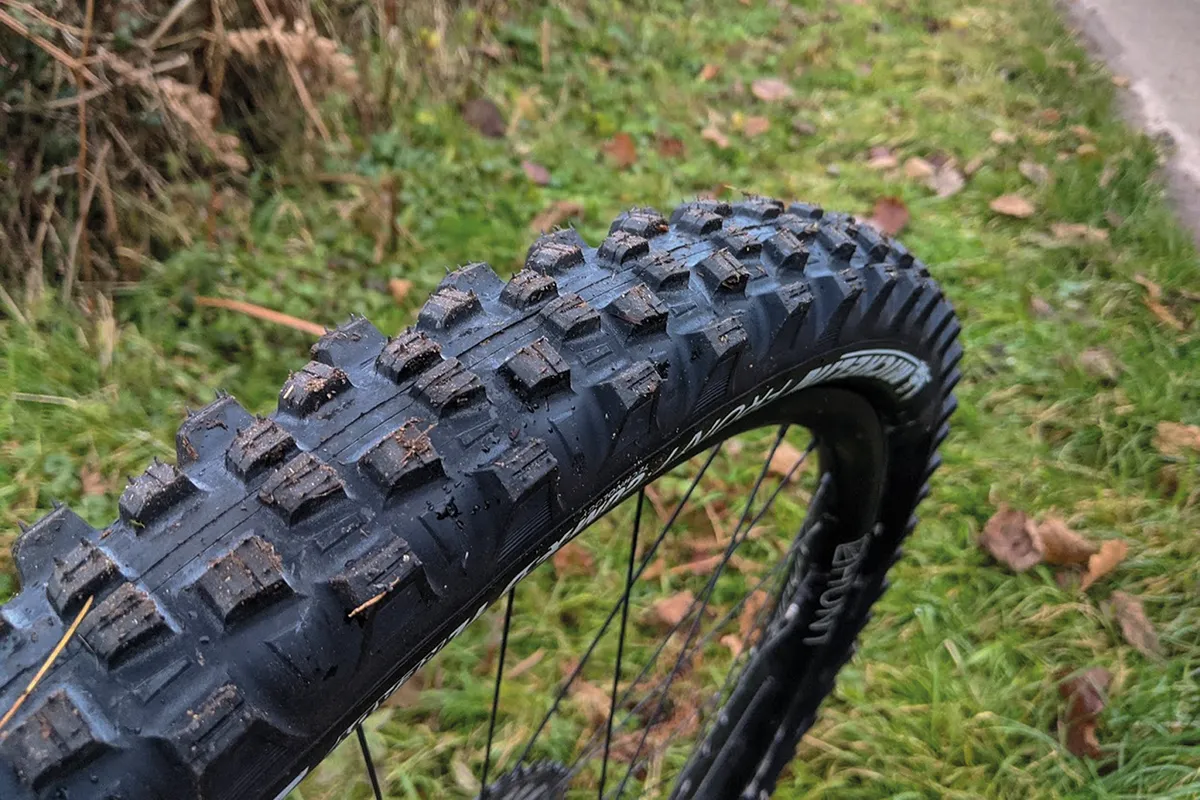
- £45 as tested
- Pros: Sticks well to wet rocks; good cornering bite in soft terrain; well-damped on rough sections
- Cons: Slow-rolling; not the best on hardpack trails
- 1,044g
- 29x2.4in tested
- Front or rear
Thanks to a tall and well-supported shoulder tread, the Wild Enduro has plenty of grip in soft terrain where it digs in to provide loads of bite.
Although this version is using the lightweight casing, the tacky rubber compound helps it feel well-damped on rough, chattery terrain, making it handle closer to a downhill tyre than an enduro one.
Maxxis Assegai 3C MaxxGrip EXO+
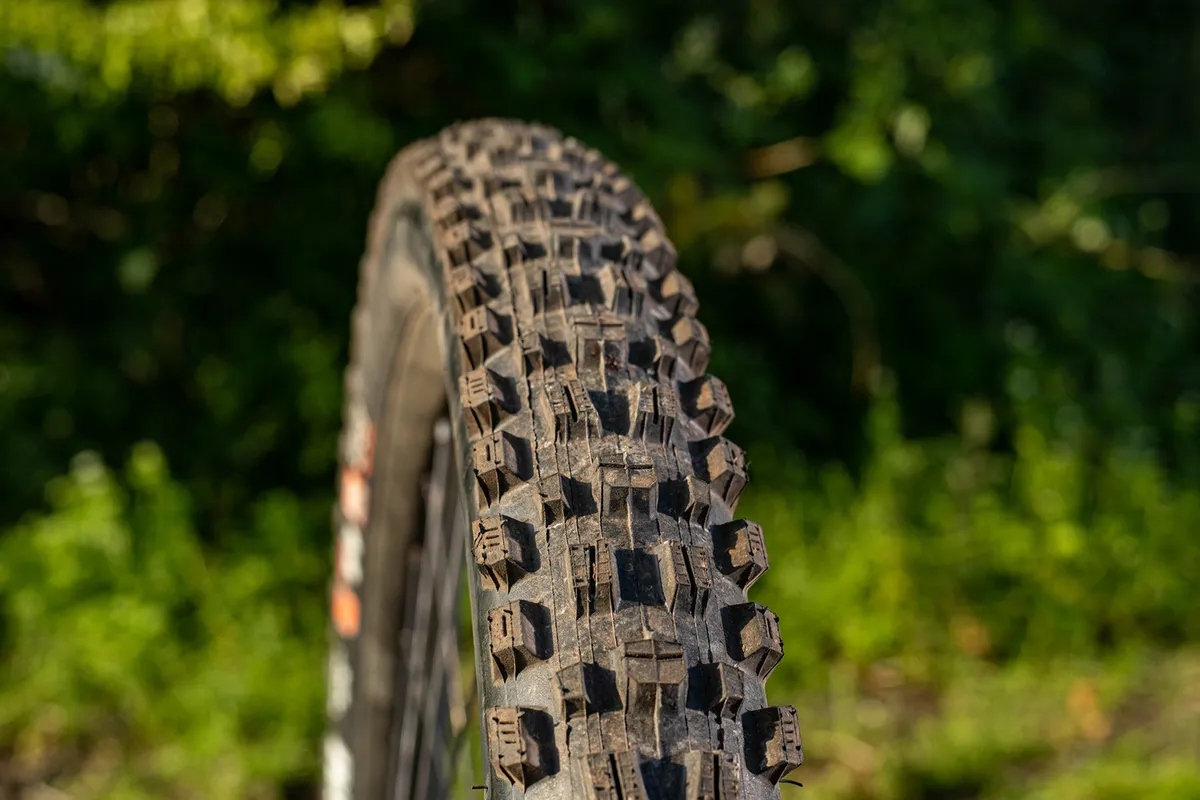
- £75 / $85 / €81.99 as tested
- Pros: Spectacular grip; sharp lugs bite cuts in deep on high lean angles; plenty of straight-line confidence
- Cons: Slow-rolling; wears faster than others; not great on the rear
- 1,080g claimed weight
- 29x2.5in as tested
- Best as a front tyre
The Assegai uses Maxxis's latest EXO+ carcass, which features a thicker fabric weave and a butyl wedge above the bead to resist snakebites and bolster the sidewall.
It feels calm and super-stable on all surfaces and conditions. The 3C MaxxGrip compound is highly grippy and gives a consistent connection to the trail, making it easy to trust.
The trade-off for this level of grip is longevity and rolling speed.
Maxxis Dissector 3C MaxxTerra EXO WT
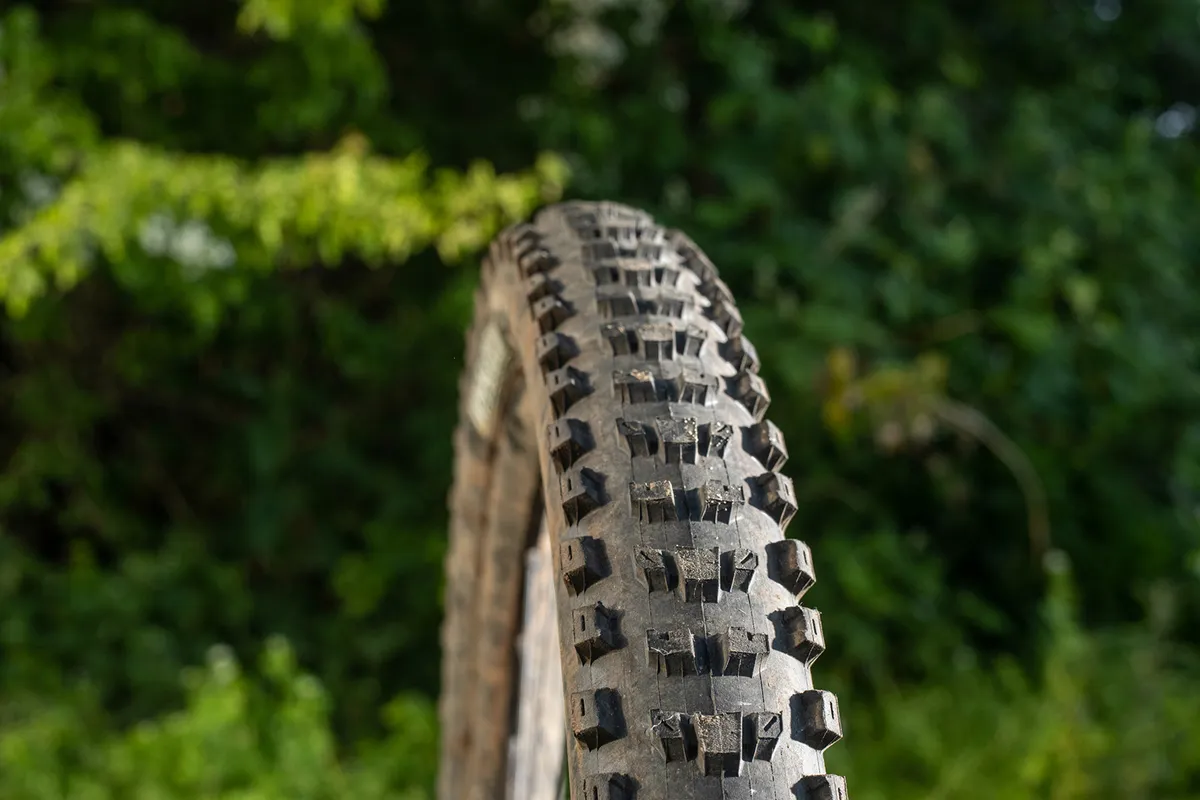
- £65 / $101.99 / €93.49 as tested
- Pros: Fast-rolling; holds well on high lean angles; decent in the wet; relatively lightweight
- Cons: Straight-line braking isn't the best
- 985g claimed weight
- 29x2.4in
- Best used as a rear tyre
Thanks to its downhill heritage, the Dissector is fast rolling with tons of grip. The tread favours dry and loose terrain, yet is effective at shedding mud in wet UK conditions.
Its key character trait is its ‘slip to grip’ cornering manners. The open centre tread means it accelerates quickly and has decent bite in loam and mud, plus better straight-line braking traction than other faster-rolling Maxxis tyres.
Some tyres offer more bite and comfort, but the Dissector balances weight, rolling speed and cornering grip well.
Teravail Kessel Durable
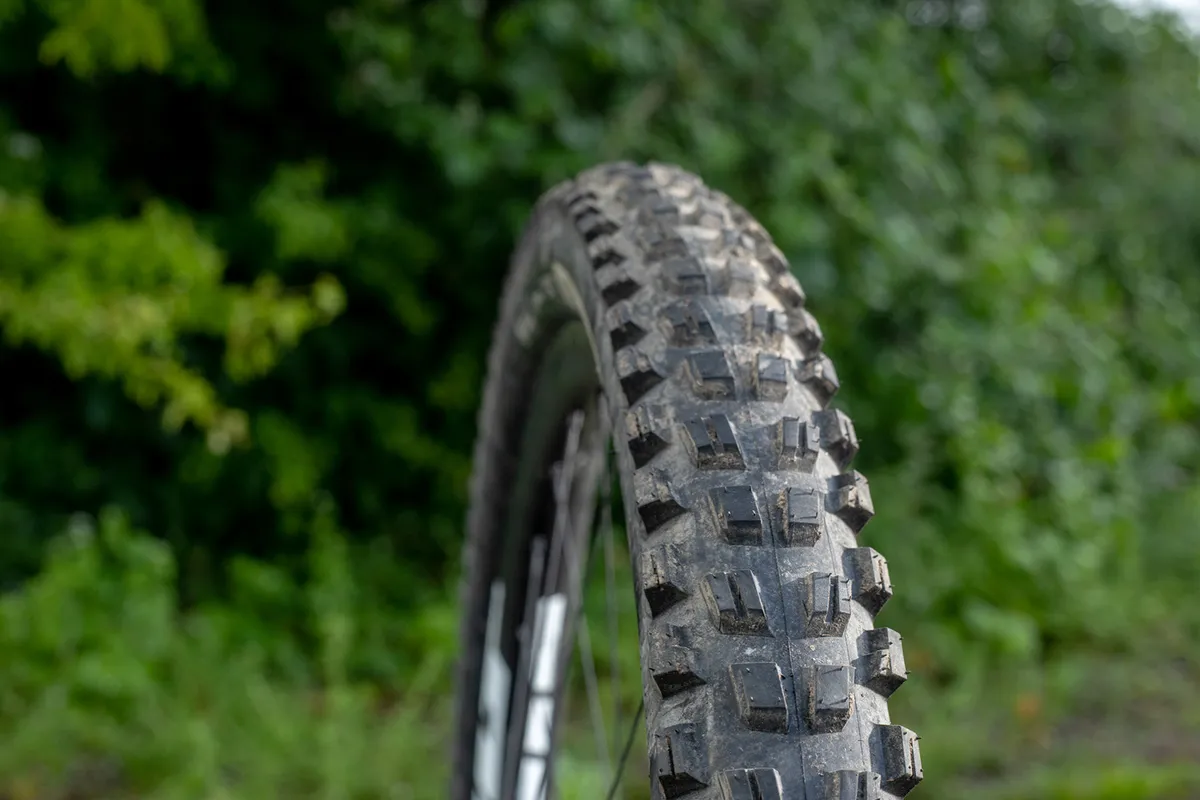
- £80 / $90 / €94.99 as tested
- Pros: Covers ground very well; brilliant wear life and remains tough on harsh terrain
- Cons: Pricey; not the most cushioned ride
- 1,158g claimed weight
- 29x2.4in as tested
- Can be used on front or rear
The Kessel rolls super-fast considering how grippy it is, and has excellent toughness and longevity, even over rocky terrain.
The tread pattern and dual-compound Grip rubber provide good traction in both wet and dry conditions.
This 2.4in version blows up a bit skinny, and damping only gets better at lower pressures, risking punctures.
Schwalbe Magic Mary SuperGravity ADDIX Soft
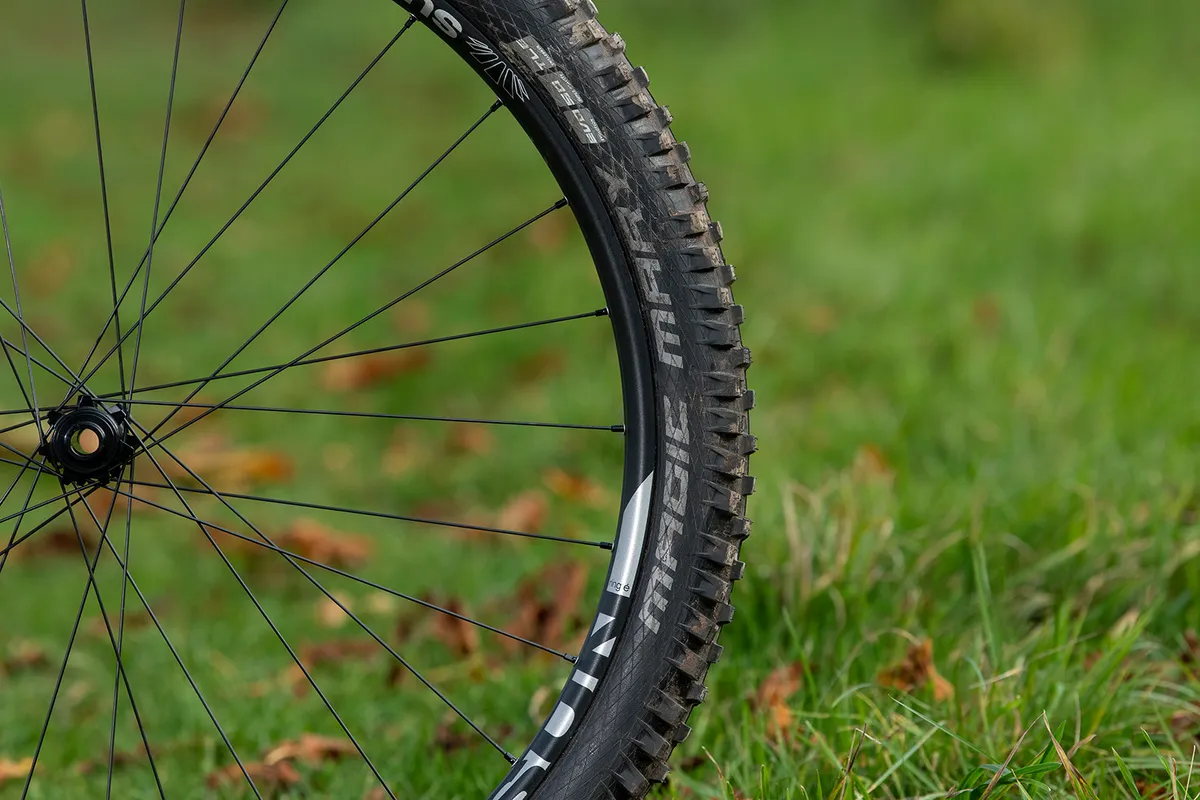
- £65 / $79.49 / €84.99 / AU$99.99 as tested
- Pros: Incredible traction in all conditions; bites well into soft and muddy trails; rolling-resistance isn't too bad considering the grip
- Cons: Mud shedding not quite as good as dedicated mud tyre
- 1,340g claimed weight
- 29x2.6in tested
- Best as a front tyre
Schwalbe’s Magic Mary scored highly for its exemplary traction and is particularly well suited to soft mud, although it's not quite as confident in sticky mud, compared to dedicated mud tyres.
The tyre has great amounts of braking grip due to the tall tread pattern. There is plenty of edging tread and a generous gap to the centre tread to help bite into corners and off-camber slopes.
Schwalbe Hans Dampf SuperGravity ADDIX Soft
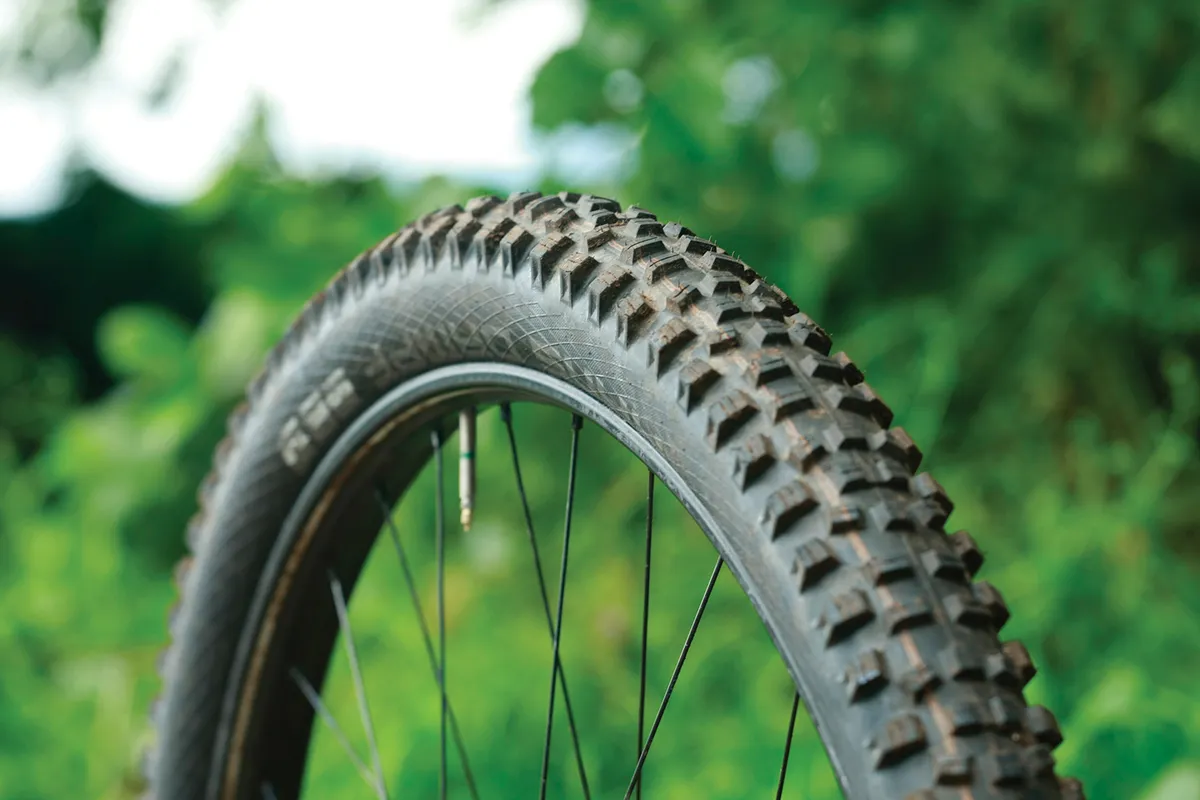
- £59.99 / $98.99 / €84.99 / AU$99.99 as tested
- Pros: Well-damped on rough terrain; plenty of grip on rocky trail sections; predictable in the corners
- Cons: Not the grippiest in soft or muddy conditions
- 1,168g claimed weight
- 29x2.35in tested
- Best as a rear tyre
Best-suited to rocky, hardpack terrain, the Schwalbe Hans Dampf SuperGravity ADDIX Soft has great straight-line grip with impressive rolling speed. It's also predictable when leaned over for cornering thanks to its bulky side knobs and the ADDIX Soft rubber is well damped.
It's not quite up there with the best-performing mountain bike tyres on soft, boggy terrain, though.
Michelin Wild Enduro Rear Gum-X
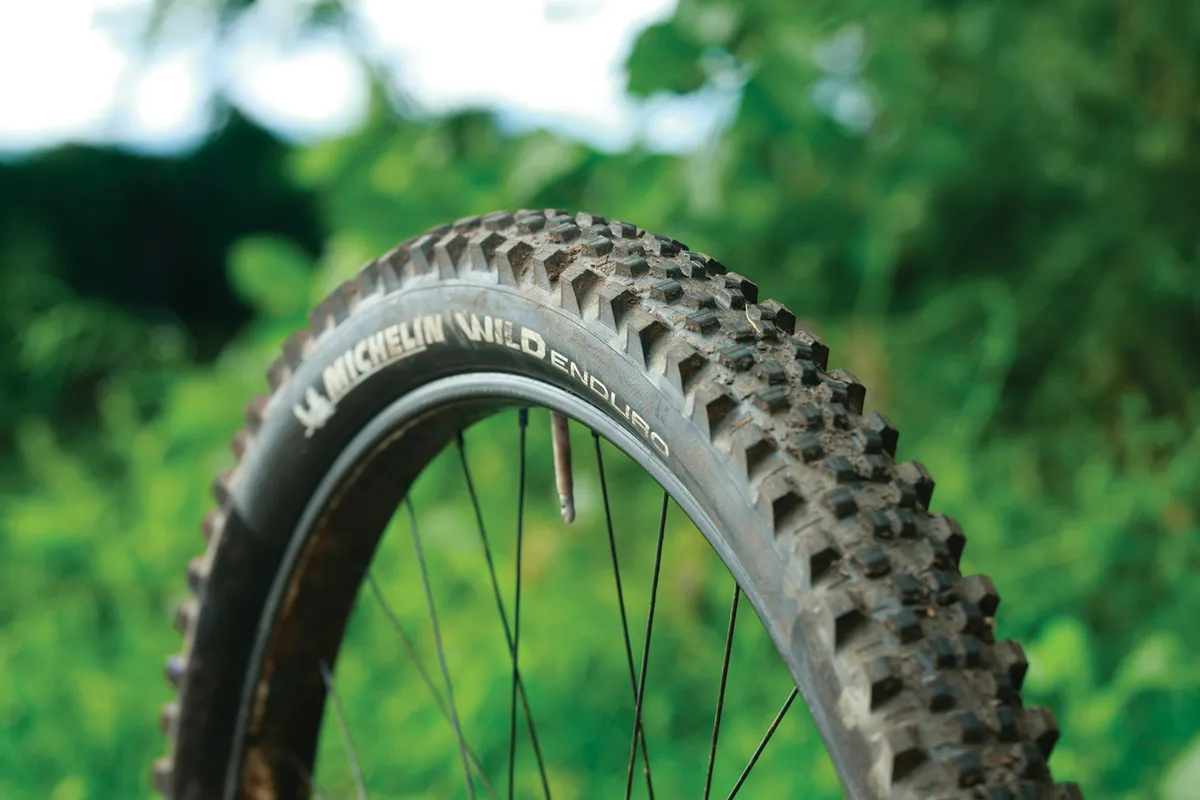
- £45 / $61.84 / €71.34 as tested
- Pros: Great traction in the turns; good grip on wet roots and rocks; priced competitively
- Cons: Not the best braking bite in soft conditions
- 1,194g
- 29x2.4in tested
- Best as a rear tyre
Thanks to a chunky sidewall, the Wild Enduro Rear has plenty of puncture protection and closely spaced knobs to improve rolling speed. Thanks to the Gum-X compound, it offers incredible grip in slippery, muddy and wet conditions, but this means it rolls slower than its competition.
The Wild Enduro Rear is best saved for the worst of winter or sloppy summers.
Vee Tire Co Attack HPL Top 40 Compound Tubeless Ready Enduro Core
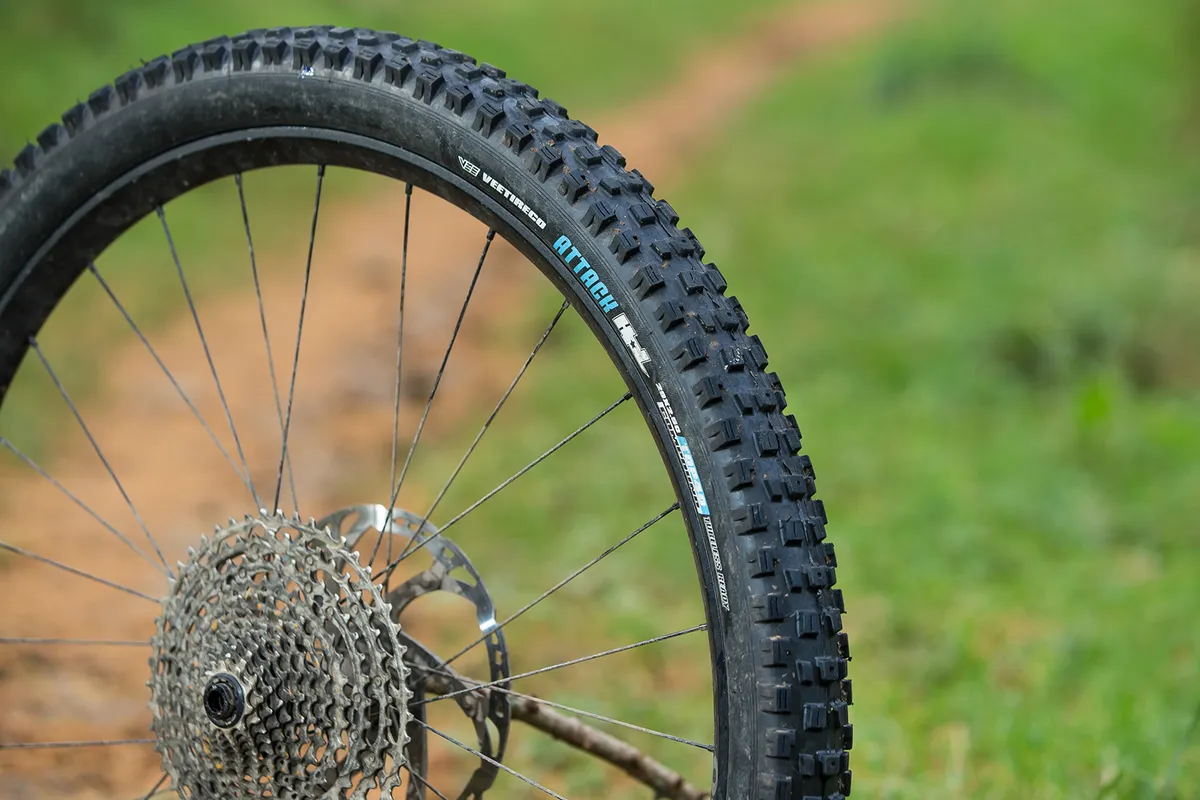
- $87 / €59 as tested
- Pros: Predictable cornering control; damped ride feel; almost endless grip
- Cons: Slow rolling speed
- 1,151g claimed weight
- 29x2.5in tested
- Best as a front tyre
Vee Tire Co’s Attack proved impressive on corners with its excellent carcass strength and provided great grip, no matter how hard they were pushed. The sidewall is tough and the tread compound satisfyingly tacky.
The downside to stability and grip are slow rolling speeds on flatter sections, despite the rounded profile. Our sample also leaked air, requiring constant top-ups while riding, which was unfortunate.
Vee Tire Co Snap Trail Top 40 Compound Tubeless Ready Enduro Core
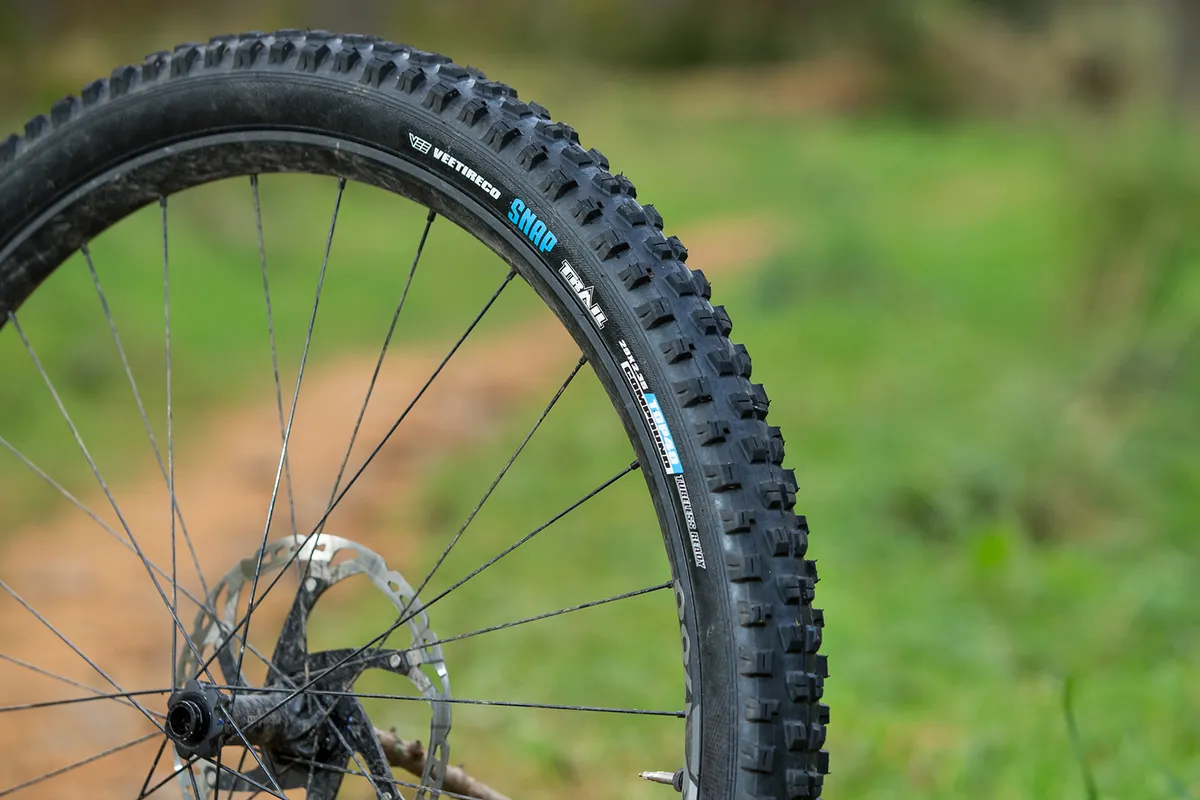
- £54.99 / $87 / €59 as tested
- Pros: Easily installed; great turning and braking performance; works well on a variety of trails
- Cons: Slow rolling
- 1,050g claimed weight
- 29x2.35in tested
- Best as a rear tyre
Vee Tire Co says the Snap Trail Top 40 can be used for all disciplines except lightweight cross-country. On the trails, we found these to be one of the grippiest tyres out there and it was nigh-on impossible to force it off line. It has great turning ability and braking performance.
The tyre features a rounded profile that increased lean angles, allowing more predictable turns. We also found they sealed easily on installation.
They are though quite slow rolling on most terrains, and that is the price paid for the exceptional grip.
WTB Judge TCS Tough Fast Rolling
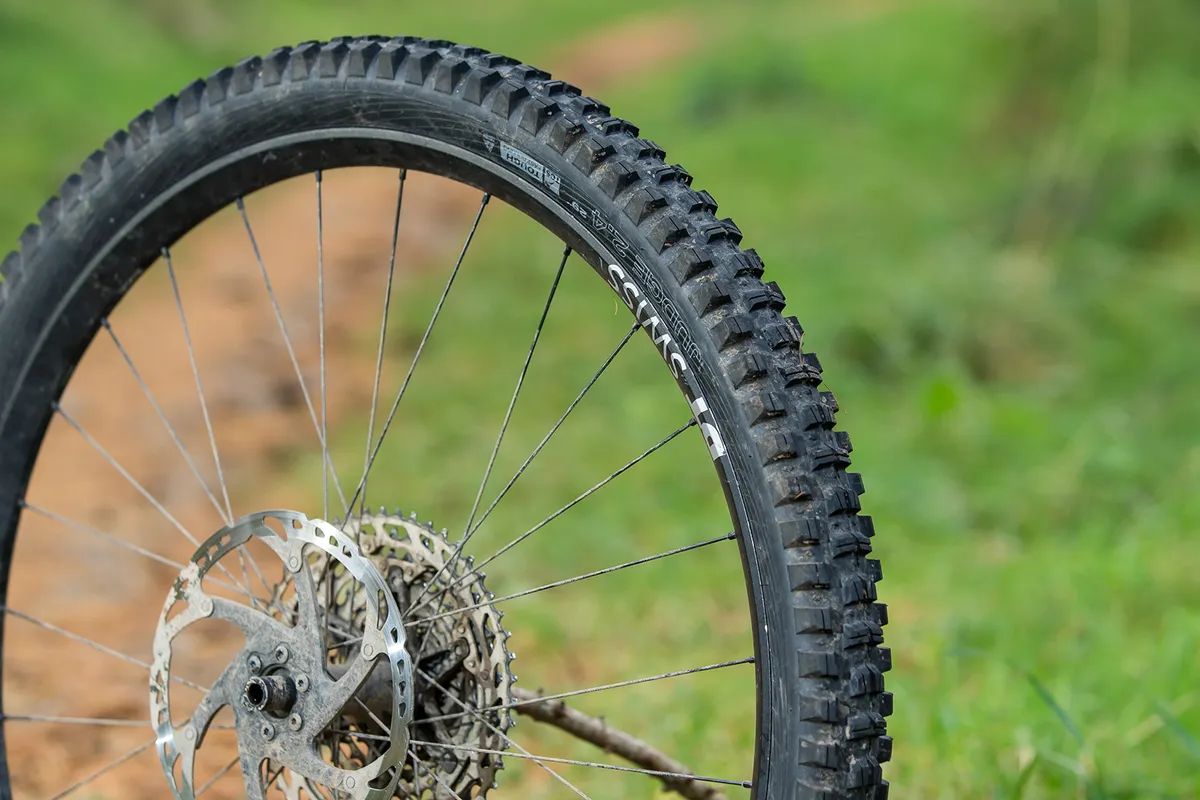
- £58 / $84 / €69.95 as tested
- Pros: Plenty of traction on a variety of terrain; stable carcass provides confidence at high speed: good hardpack performance
- Cons: Couldn't get our test sample to seal
- 1,352g claimed weight
- 29x2.4in tested
- Best as a rear tyre
WTB’s Judge is the most aggressive rear tyre the brand offers. Even with Fast Rolling compound, there is plenty of traction on offer. This is thanks to the large central knobs that alternate between long and wide to blend braking performance and reduce rolling resistance.
WTB recommends pairing with a Verdict up-front.
The Judge has a fairly rounded profile, which helps to provide consistent and predictable cornering grip. The traction is so assured that our tester struggled to ride off-line.
They provide all-round grip for different terrain types and work well in slimy terrain too.
The only negative is that we couldn’t achieve a permanent seal on our sample.
Schwalbe Big Betty EVO Super Gravity Addix Soft
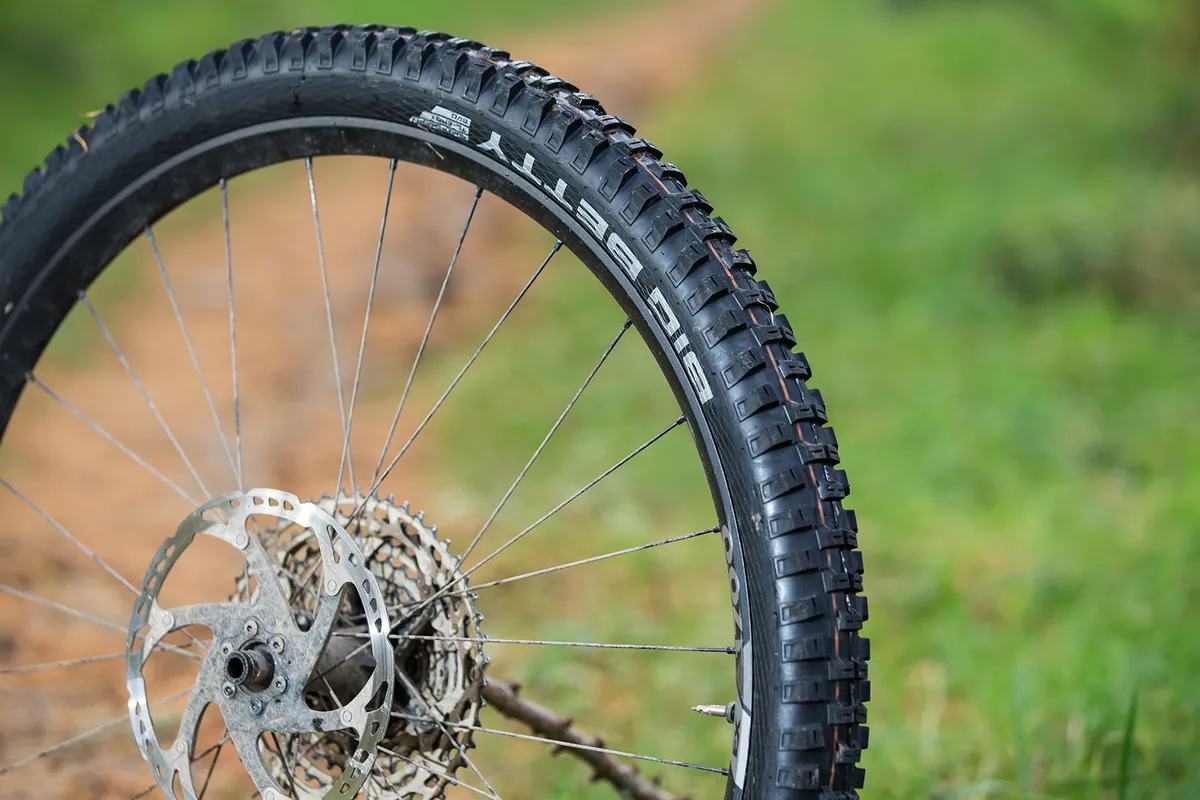
- £65 / $94 / €84.99 as tested
- Pros: Great braking bite; carcass provides good stability in the turns
- Cons: Difficult to install on our test rims; not the best on wet roots
- 1,396g claimed weight
- 29x2.4in tested
- Best as a rear tyre
The tread pattern of the Schwalbe Big Betty EVO features large, widely-spaced central horizontal blocks to create plenty of braking traction and clear mud. There are also side knobs for improved cornering grip.
We found the carcass to be well-damped over rough terrain, offering plenty of braking traction. The tyre would only drift when pushed to the limit. They grip well on rocks but they’re not a fan of wet roots, despite the soft compound.
We found the tyre tricky to mount but it fully sealed once inflated and held air over the test period.
WTB Verdict 2.5 TCS Tough High Grip
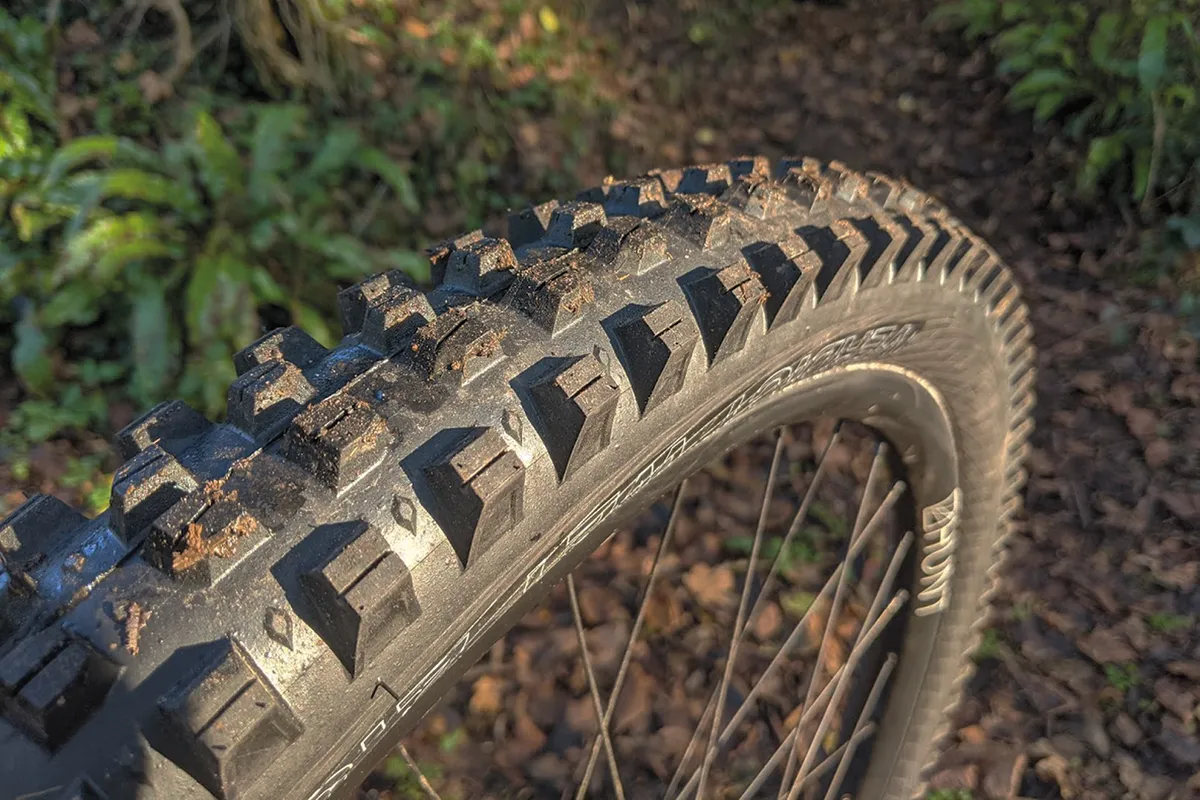
- £58 / $79.95 / €63.50 as tested
- Pros: One of the best tyres around for muddy trails; good damping through rocky sections
- Cons: Slow rolling; square side lugs can feel vague when cornering
- 1,345g claimed weight
- 29x2.5in tested
- Best as a front tyre
The WTB Verdict 2.5 TCS Tough High Grip offers fantastic wet-weather grip, especially if the trails are sloppy and soft.
WTB also makes a Wet version of the Verdict with even bigger knobs, but we never felt like the standard one needed more to contend with the best mountain tyres. Its compound makes it stick to wet rocks and roots, too.
It doesn't roll very fast though, and isn't very grippy or predictable on hardpack trails, or when you're leaning the bike over in turns.
How we tested mountain bike tyres
Mountain bike tyres are usually discipline-specific, with each tyre requiring different qualities to compete in their respective category.
Overall grip and toughness are essential for all tyres as they are the fundamental components separating you from the trail below.
When testing tyres, various riding conditions are required to see how well a tyre copes with wet weather, dusty or dry terrain, rocks and different trail surfaces.
For XC tyres, lightness is often a key attribute that riders look for, with lighter overall weight helping on the hills and a lower unsprung mass resulting in faster acceleration out of the corners.
This is less of a concern for trail, enduro and downhill where overall traction and carcass strength are considered the main priority to stay in control and avoid flats.
Because of this, we have a slightly differing approach to testing tyres depending on their discipline.
Price is also a consideration, with the best tyres ranging from £35 / $40 / €40 to £85 / $100 / €100.
Tyres often come in various compounds, with soft compounds offering more grip on rocky trails while hard compounds tend to provide higher rolling speeds.
We test tyres over a sustained period, making sure we get enough riding in to find the highlights and shortcomings of each, while also taking note of tyre wear.
Most tyres are tested in back-to-back group tests, giving us a good comparison to other tyres on the market.
Mountain bike tyres buyer's guide
Your tyres make a massive difference to the character and ride of your bike. We bring you the lowdown on what to look for when buying new mountain bike tyres.
What to look for when buying mountain bike tyres
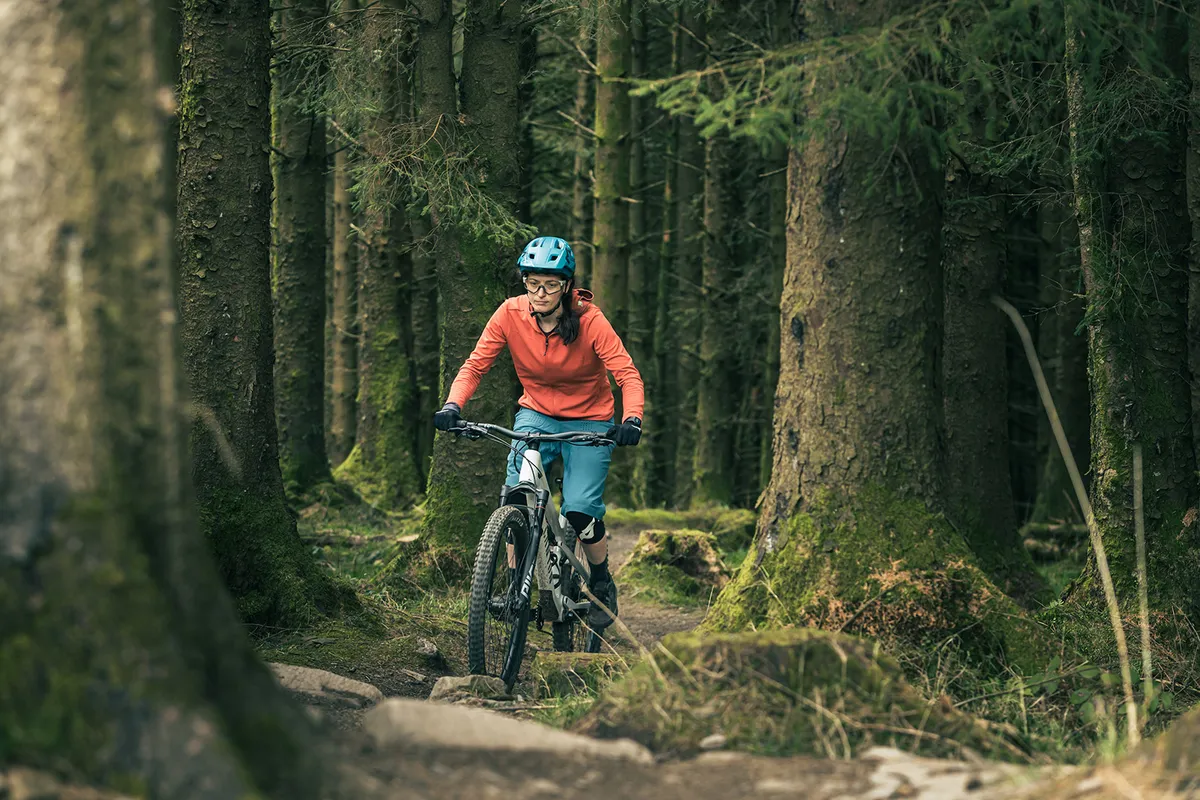
You can’t overstate the importance of a good set of tyres. They drastically affect how your bike rides, so skimping is a false economy. Finding the best tyres for your needs is far from straightforward though.
Width
Width is crucial. Wider tyres roll faster over soft or bumpy terrain – in timed tests we’ve consistently ridden DH tracks faster on them – so many brands now offer 2.6in options. But a fatter tyre won’t suit everyone, because they can have a bouncy ride feel and won’t fit all frames.
Tread
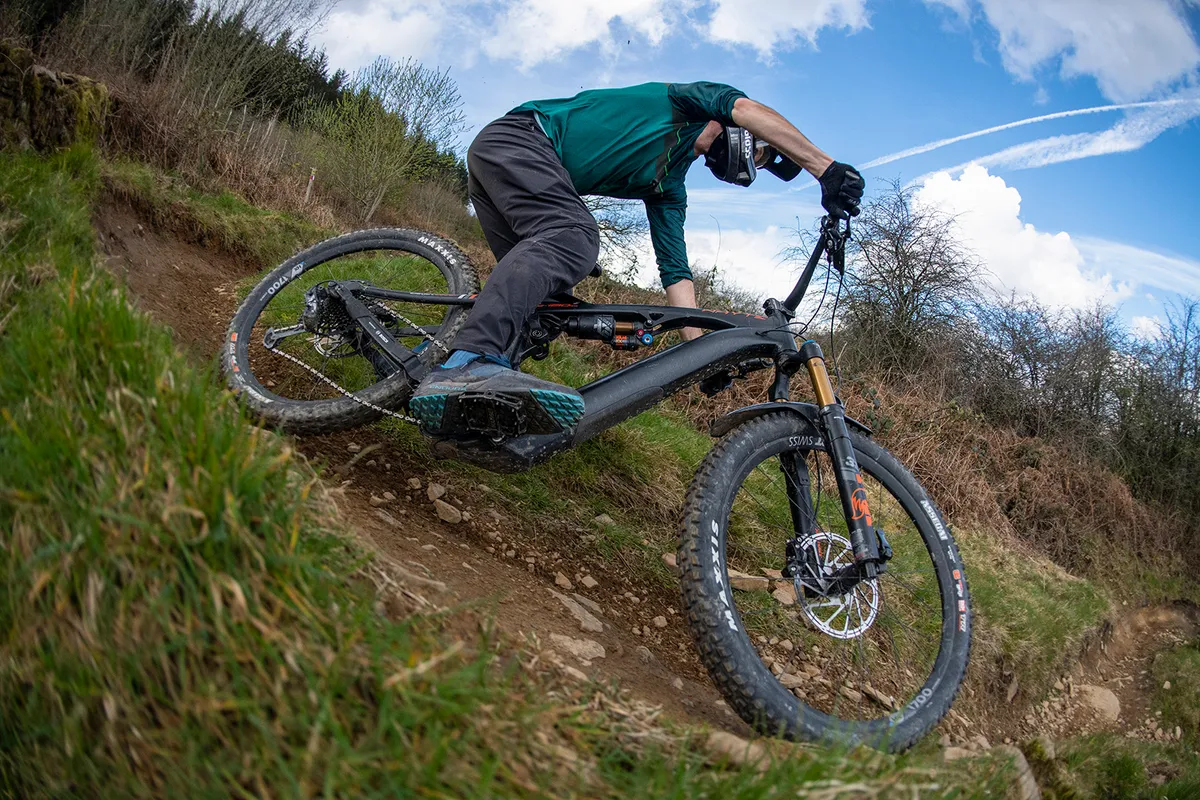
Tread pattern is a key consideration too. Tall, widely-spaced knobs are ideal for muddy or loose terrain, while shorter tread blocks tend to be faster – rolling and more predictable on hard surfaces.
Compounds
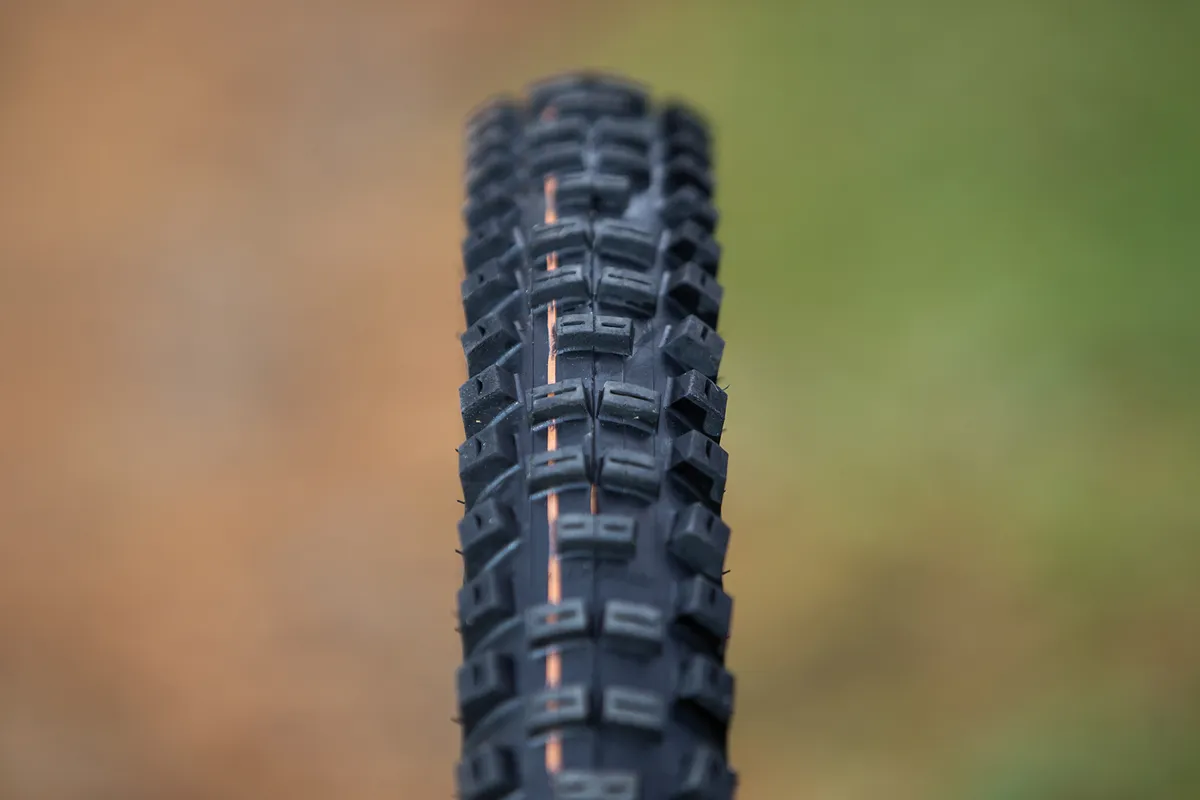
Most MTB tyres are available in several rubber compounds. Softer compounds grip better on roots and rocks, and have a more ‘planted ’ ride feel, because the rubber absorbs more energy from bumps. The downsides are that they wear faster and have more rolling resistance.
Casing
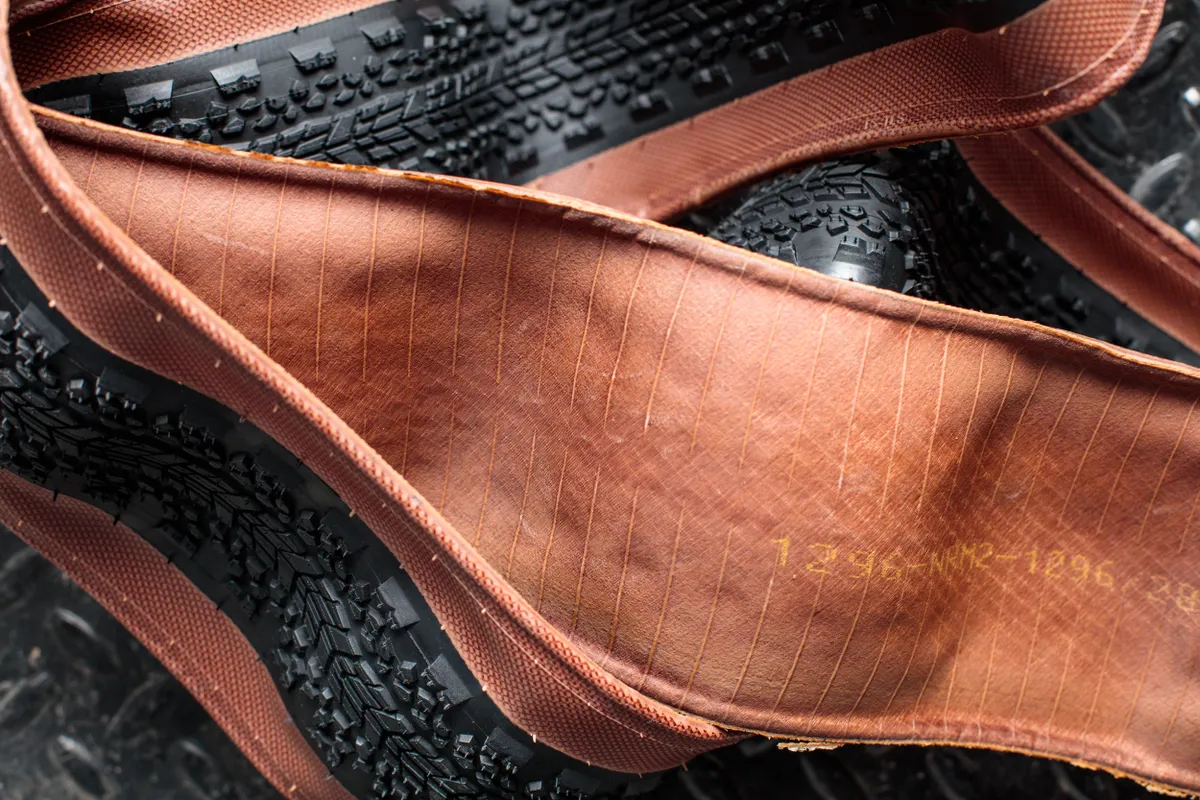
Many tyres come with a choice of casings too. Our guide to mountain bike tyre carcass construction has all the detail.
But in short, thicker carcasses are less likely to puncture. Due to stiffer sidewalls, they can usually be run at lower tyre pressures without the sidewall collapsing when cornering. They also provide more damping, so are less bouncy over bumps.
Thinner casings roll faster, especially over bumpy ground, and transmit less feedback at a given pressure.
Front or rear
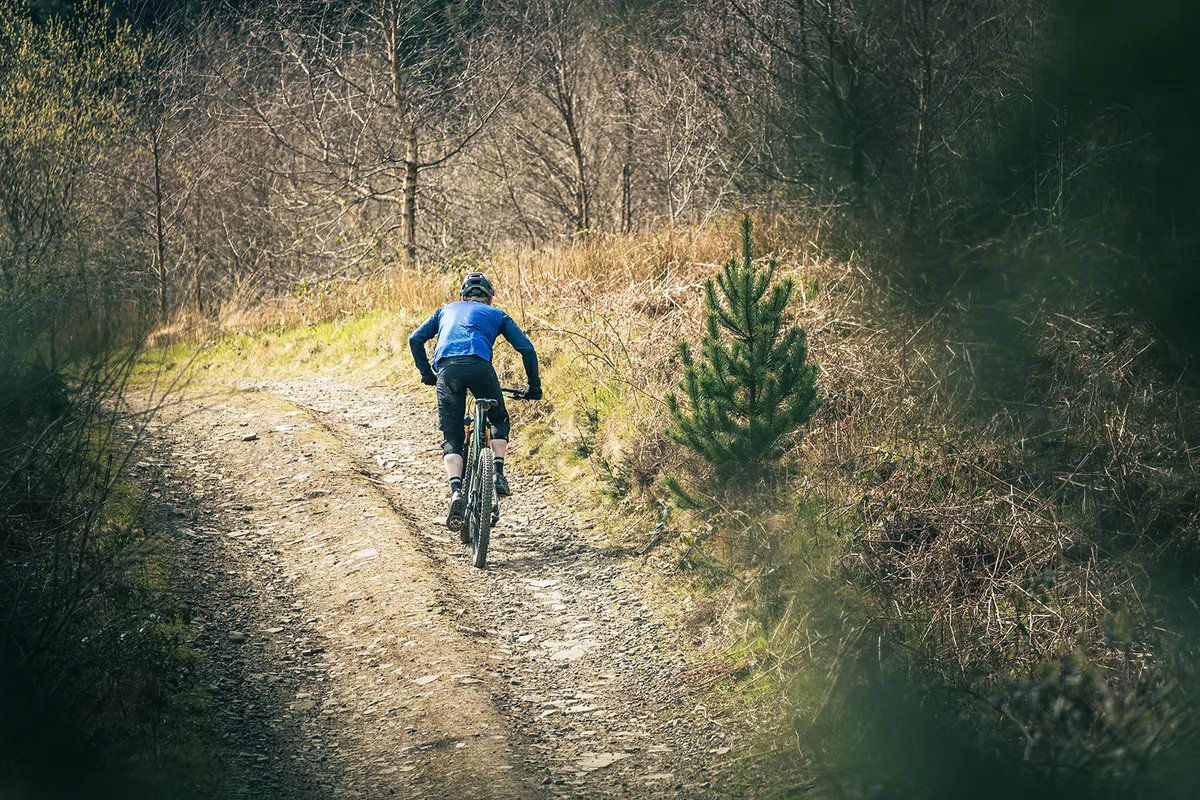
Tyres are becoming increasingly specialised for the front or rear wheel. Rolling resistance and puncture protection are more of an issue on the rear, as it supports most of the rider’s weight, whereas grip is more important up front, to stop your front wheel sliding out.
That's the basics covered but we've also added an in-depth buyer's guide and glossary at the end of the article, to help you find exactly what you need.
Many of the MTB tyres we've tested recently, and have been impressed by, have been orientated towards trail and enduro riding, and this is reflected in our current list. We have more tyre reviews in the pipeline, and will only recommend tyres we've tested and that are current models.
Should I use tubeless tyres?
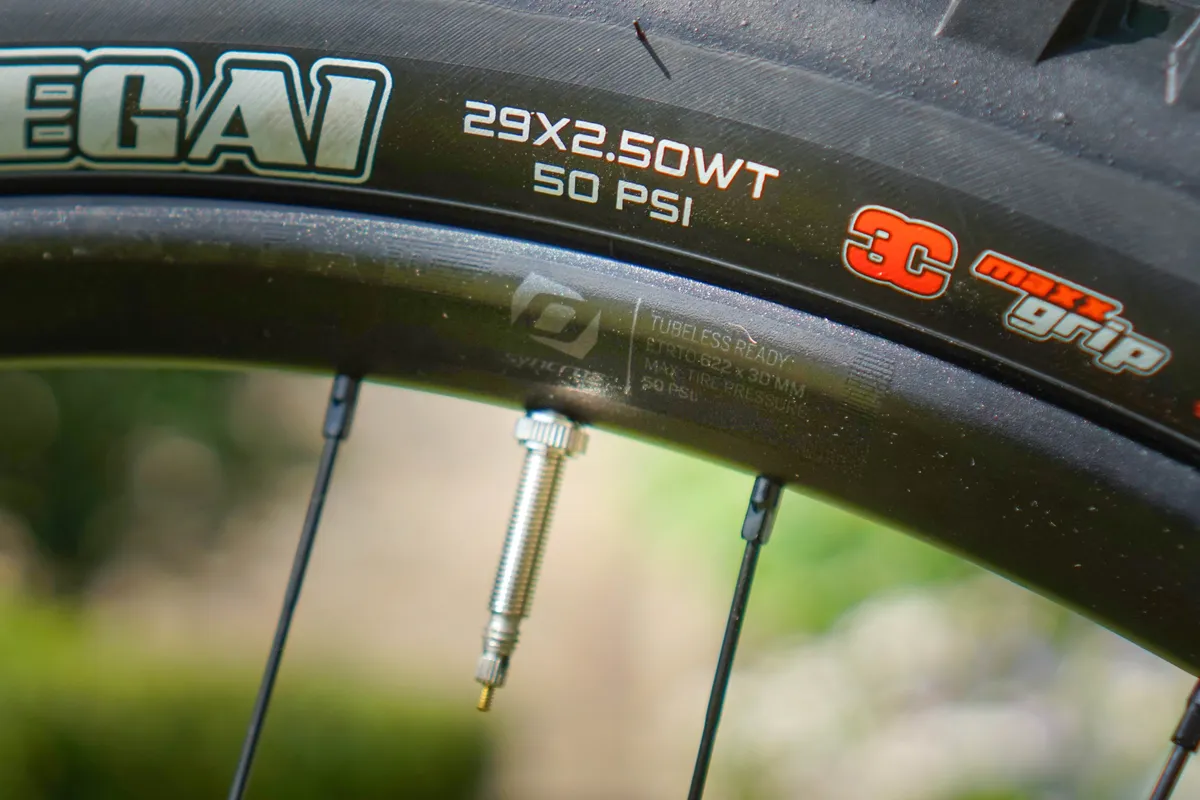
Traditional tyres use an inner tube to keep them inflated, but how do 'tubeless' tyres work?
Tubeless tyres ditch the inner tube in favour of a tyre that's specifically designed to be airtight, either through the use of an additional layer of rubber or the use of a latex-based tubeless sealant.
Mavic's UST (Universal System Tubeless) system uses a thick side-walled tyre that locks into a specific sealed-bed UST rim. The advantage is an airtight seal with or without a sealant liquid inside, and very stable, pinch puncture-resistant, low pressure performance.
The downsides are that these tyres are more expensive and also heavier.
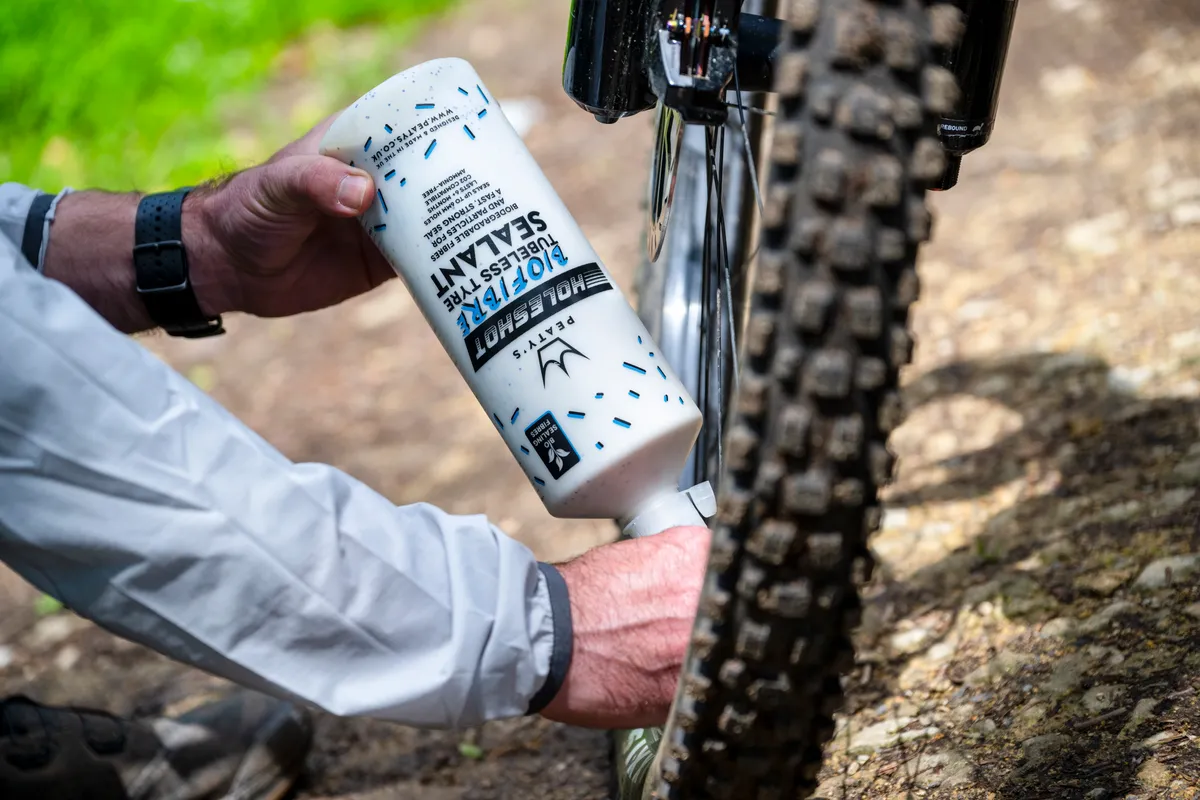
Most mountain bike tyres on the market today use some sort of 'tubeless compatible' system. These tyres use a tubeless bead but require sealant in order to make them airtight. They also require rim tape to seal the spoke holes off.
The benefit of this system is that it is lighter than a full UST system and offers the user a wide variety of tyre choices.
The downside is that there is not an established standard between the various tyre and rim manufacturers, so some rim and tyre combinations work better than others. Even so, this is the most common tubeless option you'll encounter.
Which are better, light or heavy mountain bike tyres?
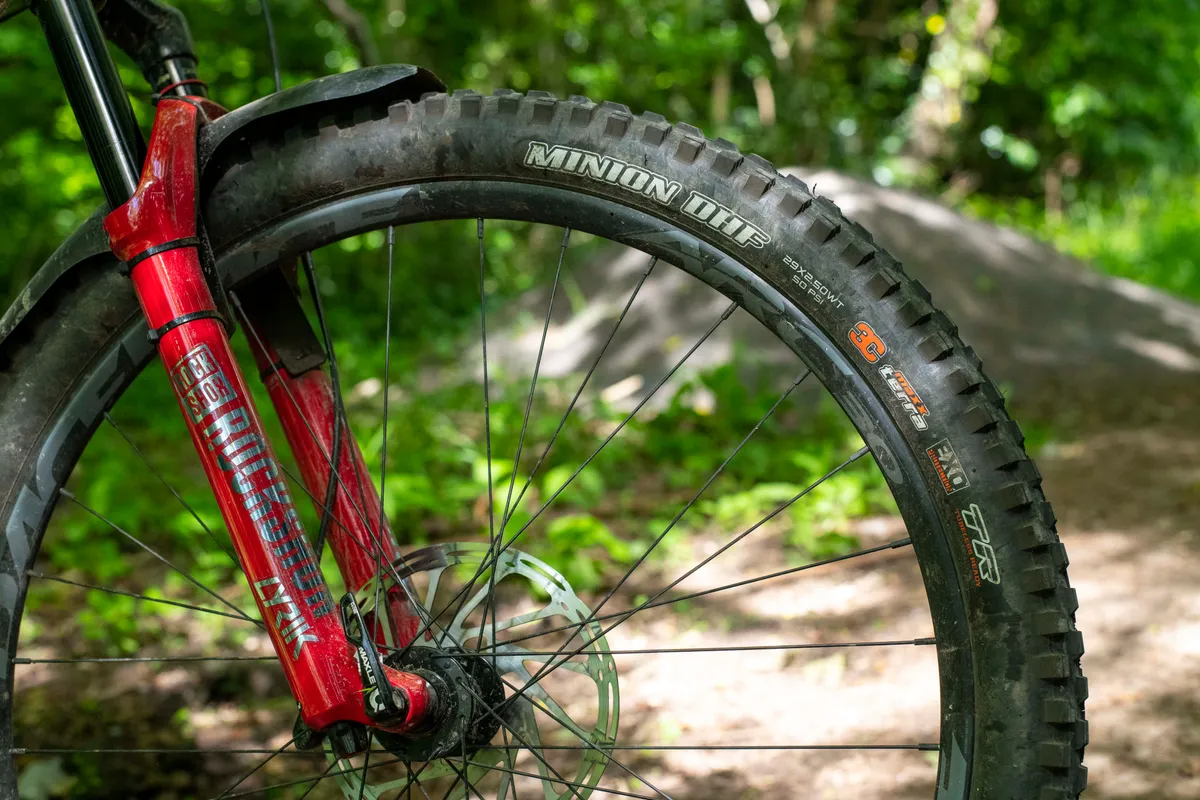
Weight has a big effect on the agility and acceleration of your bike. Light tyres are much easier to spin up to speed, change direction with and even stop, so make sense for cross-country use.
Heavier tyres are generally thicker, which means they resist punctures and pinch flats better and are less likely to flop and roll off at low pressures. Heavier tyres also increase the gyroscopic effect of the wheel, making the bike more stable on the ground or in the air.
At the really heavy end, reinforced-carcass downhill tyres are designed to be run at low pressures without popping or tearing off the rim, and rely on the help of gravity to get their 1kg-plus weight moving.
What width mountain bike tyre should I use?
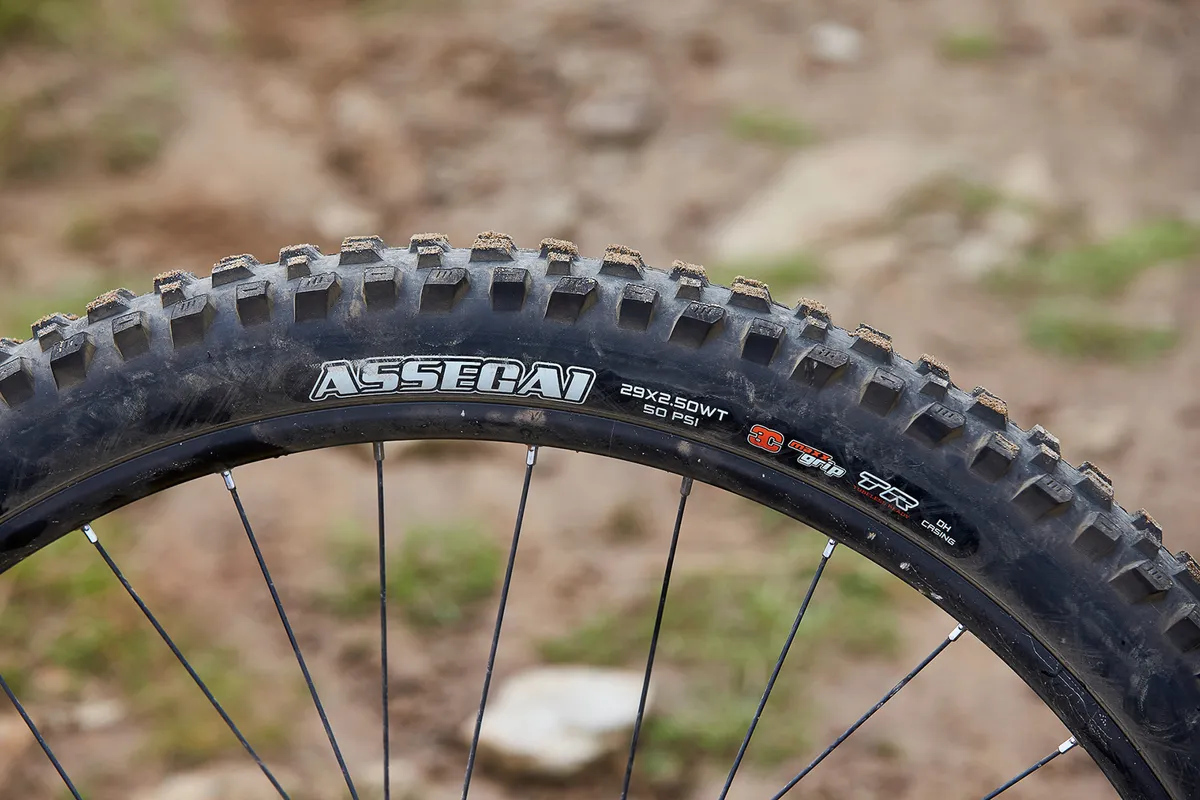
There's a massive range of tyre widths available from 1.5in to 5in fat bike tyres. The majority of mountain bikers run tyres in the 2.2in to 2.5in range, and more recently up to 2.6in has become commonplace.
Tyres in this range offer good protection and grip for more aggressive riding. Narrower tyres offer less cushioning and have less 'footprint' to grip with.
Pinch flat resistance is lower, too, unless narrower tyres are running higher pressures. They are lighter and roll faster though, and often cut through sticky mud and gloop better.
Square-profile tyres have more edging grip but are harder to lurch into corners. Rounder tyres roll more easily into corners and slide more predictably. Edge grip isn't as aggressive, though.
There's a massive range of tyre widths available, from 1.5in to 5in fat bike tyres. The majority of mountain bikers run tyres in the 2.2in to 2.5in range, and more recently up to 2.6in has become commonplace.
Cross-country tyres are likely to be at the narrower end of the scale, while trail/enduro tyres tend to be a little wider. Tyres in this range offer good protection and grip for more aggressive riding.
Narrower tyres, on the other hand, offer less cushioning and have less 'footprint' to grip with. Pinch flat resistance is lower on narrower tyres, too, unless they are being ran at higher pressures, which in turn could negatively affect grip.
Narrower tyres often cut through sticky mud and gloop better, though.
Ultimately, the ideal tyre width depends on what you're riding, where you're riding and how you're riding. Weighing up all three aspects will help you find the right tyre.
For a more in-depth explainer on the subject, head to our ultimate test on mountain bike tyre size to determine the fastest width for trail mountain bikes and enduro riding.
How grippy are mountain bike tyres?
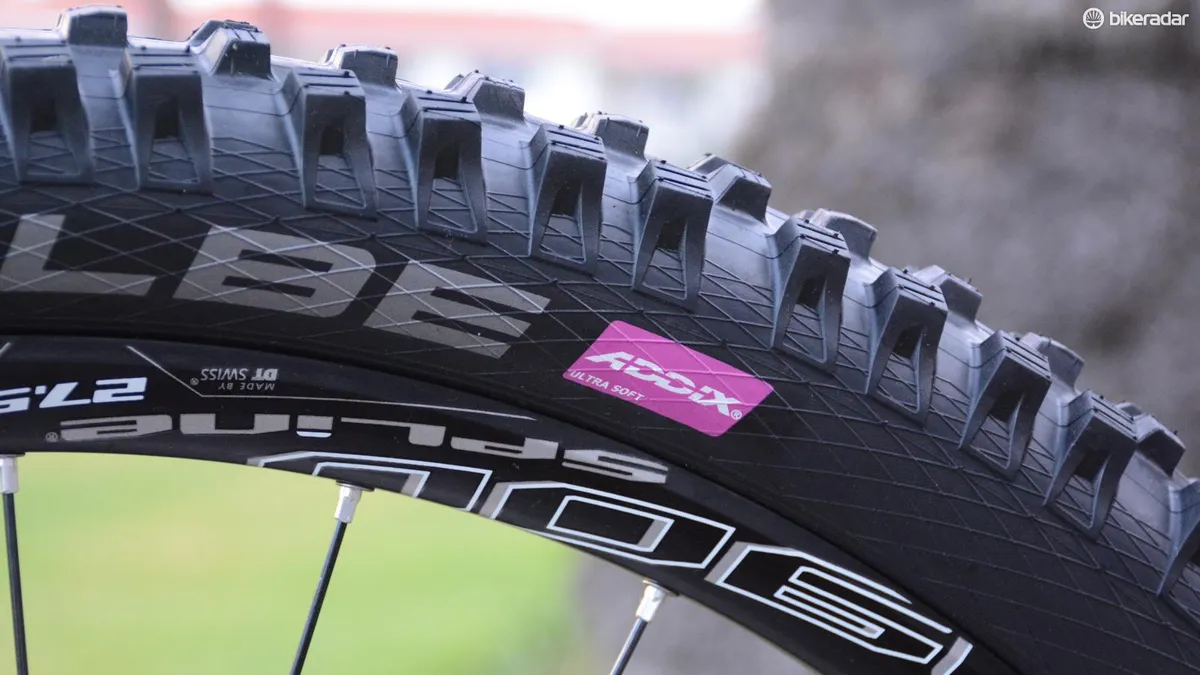
This depends on the profile of the tyre, tread pattern, its durometer rating (how soft the rubber the tyre is made from is) and the overall build of the tyre.
Bigger gaps between tread blocks help a tyre shed mud, while taller spikes grip better in soft conditions. This type of tread has more rolling resistance than a lower-profile, more tightly-spaced design though, and can squirm on harder surfaces.
A tyre with a square-profile will have more edging grip but is harder to lurch into corners. Rounder tyres roll more easily into corners and slide in loose terrain more predictably. Edge grip isn't as aggressive, though.
It’s a slightly simplistic summary, but a tyre that grips well because of a sticky/softer rubber compound and tall square-edged knobs will have more drag than those that don’t. But within this generalisation there are some notable tyres that reduce drag with a slight sloping of tread patterns, multiple tread compounds or the use of a ‘fast’ carcass.
Conversely, some tyres that have barely any tread actually bite as well as some mid-knob rubber.
Some tyres use different compounds for the centre and edge tread blocks, to balance rolling resistance, grip and durability.
All of this depends on your local terrain as well – a super chunky aggressive tyre won't be as useful on the slick rock of Moab as a lower profile tyre.
Glossary
- Shoulder: The edge tread that provides off-camber and cornering grip
- Sidewall: The bare side of the tyre, between the tyre tread and rim bread. Double or 'two ply' on DH tyres for extra stability and pinch flat resistance; airtight on UST tyres for tubeless running
- Damping: Ability of a tyre to absorb energy as it rolls over a bump. More damping means the tyre rebounds slower, giving a less bouncy ride with better grip and control but more rolling resistance
- Bead: The steel wire or Kevlar cord at the base of the sidewall that locks into the rim lip to keep the tyre in place. Kevlar or Aramid fibre beads are lighter and let the tyre fold, but are more expensive and the tyre is more likely to detach from the rim if flatted
- Carcass: The fabric body of the tyre made from overlapping nylon threads encased in rubber. A more supple carcass enables the tyre to deform around lumps for extra grip but is less stable at low pressures. A reinforced carcass is more protective and less wobbly at low pressures but heavier and less comfortable. Lighter carcasses are more likely to get punctures too
- TPI: The number of threads per inch in the carcass. Tyres with more threads are generally higher quality with a more subtle feel, but companies such as Tioga use a smaller quantity of fatter threads
- Multi-compound: Tyres that use different rubber compounds; dual compounds are normally harder in the centre or underneath for fast rolling and long life, but soft on the shoulders for cornering grip. Schwalbe and Maxxis now do triple-compound tyres too
- Durometer: The softness rating of the rubber; 70 and above is hard, 60 medium and anything below 50 is soft. The softer the tyre, the stickier it is on rocks and so on, but the faster it will wear out
- Ramps: Ramped tread blocks have a leading edge which is angled like a wedge to decrease rolling resistance
- Sipes: Small grooves cut into tread blocks to allow them to splay out like a goat’s hoof. Siped tyres offer increased grip, especially on wet surfaces
- Squirm: Lateral movement of a tyre as the sidewall or tread folds during hard cornering
What about winter mountain bike tyres?
Mountain bike tyres are usually capable of keeping traction in a wide variety of conditions and terrain, but the winter months bring around a lot more mud than in the summertime.
Why not check our list of the best winter mountain bike tyre to keep you wheels gripping in the sloppy season.
